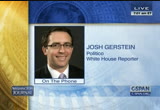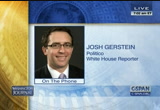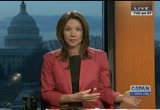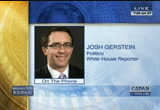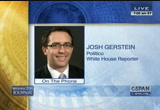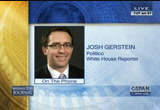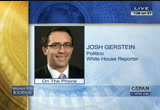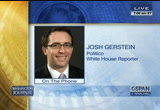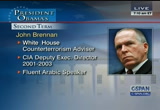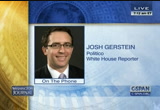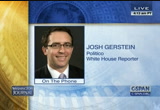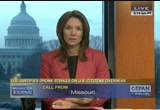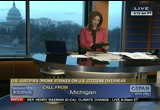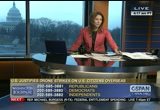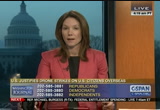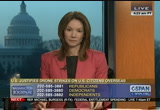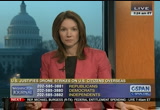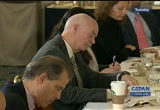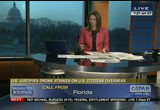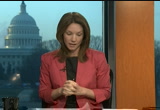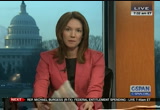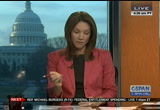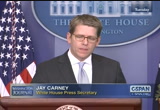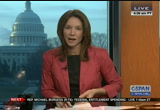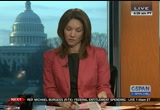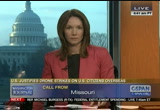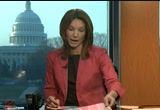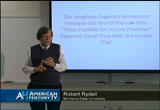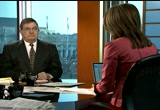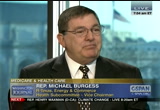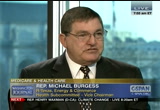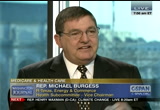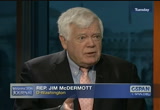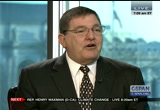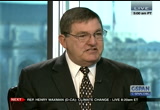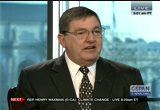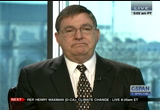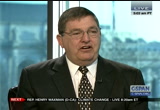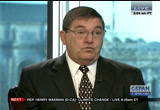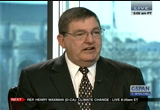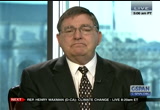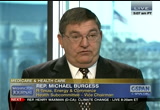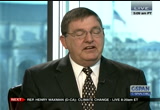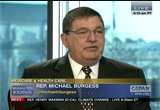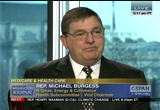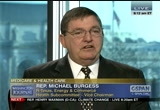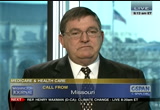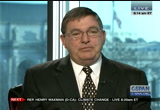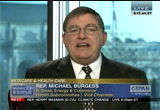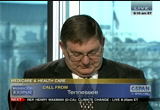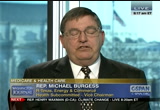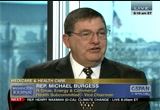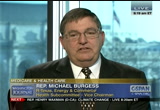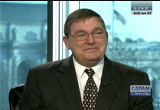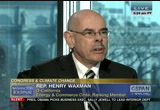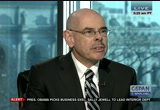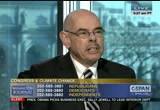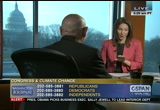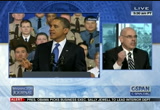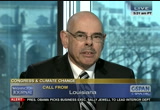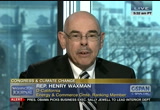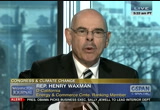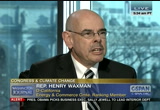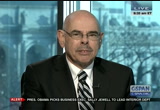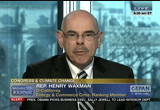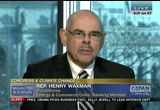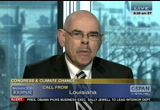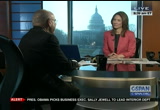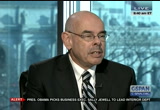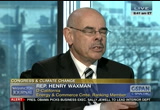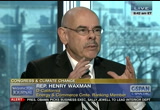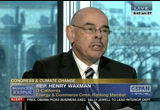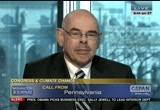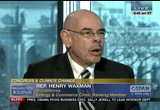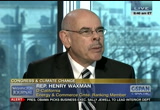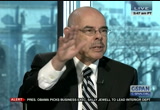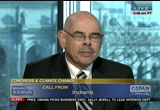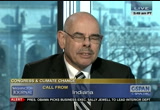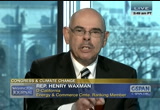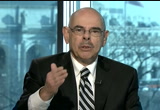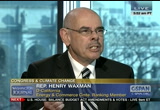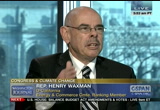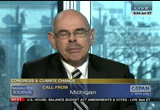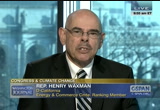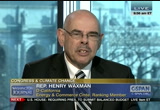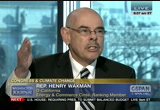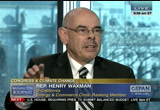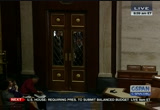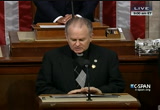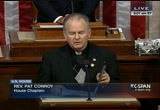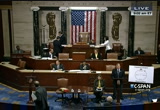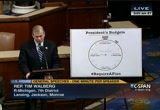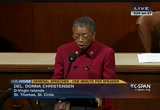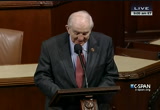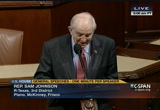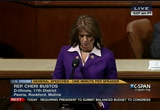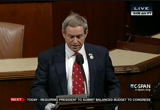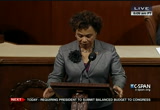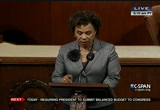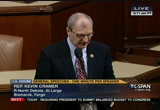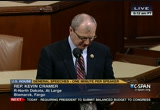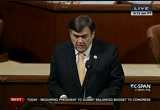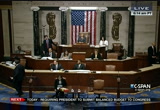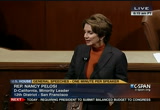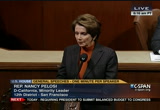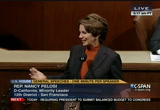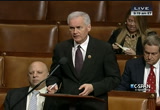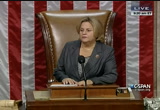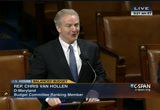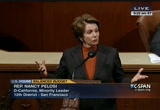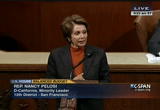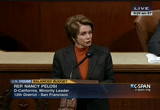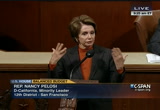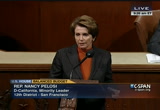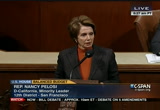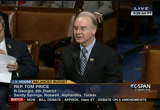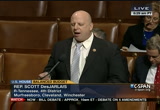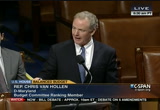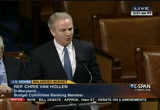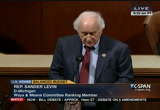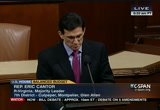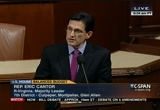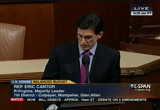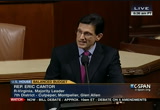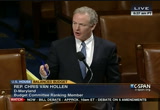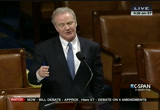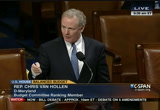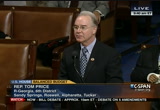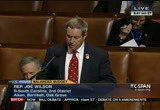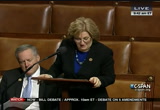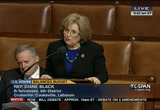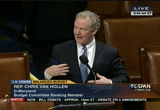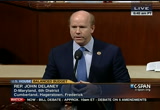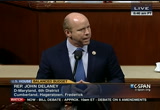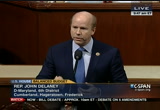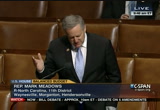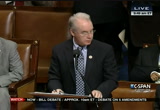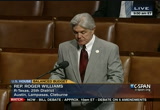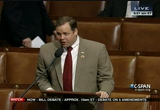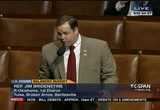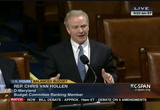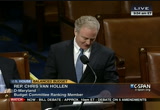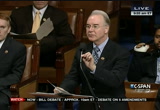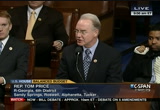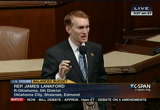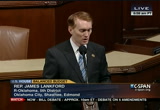tv Washington Journal CSPAN February 6, 2013 7:00am-10:00am EST
7:00 am
michael burgess about medicare, social security and entitlement spending and later, democratic congressman henry waxman discusses climate change proposals. we will also take your calls, "washington journal" is next. host: the federal deficit is expected to dip below one trillion. the news comes as republicans and democrats face a march 1 deadline to avoid billions in across-the-board spending cuts. the pentagon announced it will offer benefits to same-sex couples. in the senate is wrapping up work on the violence against women act. and the house will vote on a bill requiring the president to offer a plan to balance the federal budget in 10 years. good morning. we begin with your take on the
7:01 am
leaked white paper from the white house just fine drone strikes on u.s. citizens overseas. nbc news reported on the memo monday night and it has gotten lots of reaction in washington. what are your thoughts? call -- we want to get your thoughts on social media as well on twitter or facebook. or send us an e-mail. we will get your thoughts in a moment. first, josh gerstein is joining us on the phone. here's your headline -- what was this memo? guest: this is a white paper that looks like it was derived from some confidential legal opinions that the opinions
7:02 am
-- opinions that the justice department wrote that authorized drones or some other counter-terrorism operations to basically killed u.s. citizens overseas. and it talks about one set of circumstances. it looks like it is talking specifically about a particular country or type of country or certain type of leaders or terrorist organizations and under what conditions it would be ok to use this type of lethal force. it does not talk about drones per say, but it appears that is what they are referring to. if it does not rule out using its under other circumstances. it does not say any particular use of force against americans would be illegal. it simply says the use of force but there were contemplating here and asking for legal advice about would be legal in the view of the administration. if it looks like this paper was
7:03 am
derived from some other legal opinions and sort of oil down and summarized. we are told by officials it was provided to congress in june of last year in response to some of their requests for more explanations on the subject. host: so it was written for members of congress? did they request it? guest: that's what it looks like. for some time they have been requesting the underlying legal opinions to justify this. it appears they said we will give you a summary of the documents and that's is basically what the white paper appears to be. host: how does what is written here differ from what the administration has been saying? guest: it is not really in contradiction to what the administration has been saying, but it puts a little bit more flesh on the explanation and
7:04 am
adds more nuances and details. some of the terms of the administration has used in its public debate, it turns out that in terms of this memorandum, the meaning might be a little different than what some folks who were listing might have thought. the two different areas people have noted where the memo seems to go off in a somewhat different direction than some might have interpreted have to do with how imminent the correct person past due pose in order to be the target of a legal action like an armed drone attack for example. -- how imminent a threat a person must pose. if you have done many attacks in the past or have been involved in attacks in the past, the paper says that is a good enough reason to go after you, as long as there's no indication that
7:05 am
you have stopped that activity, even if there's no intelligence right at the moment or even very recently that you have been involved in that kind of activity. the other thing that is a little different from what people might have thought has to do with what kind of efforts the government is obliged to make to try to capture you rather than just kill you outright. in the memo, it's as if it's not feasible to capture you, then they don't have to try. we already knew that standard. what's new in the memo is it's as if a country where you might be living or hiding says they will not allow the u.s. to mount a ground operation, that renders it not feasible and they can go ahead and use something like an armed drone strikes as well. if the u.s. only knows where you are going to be for a short amount of time, if the window is short enough, that might render it not feasible to capture you. so there's more new ones that
7:06 am
people might not have realized up until now. host: the third part of this is, according to the white paper, the operation would be conducted in a manner consistent with applicable law of war principles. guest: that is a reference to certain principles that have been around for decades, many would come from the geneva convention that talk about the use of force has been proportional. you cannot just use the type of weaponry that might kill large numbers of civilians and other sort of safeguards that are pretty standard in combat and that the u.s. military uses all the time. the u.s. would be obliged to follow the type of rules anytime military personnel were involved in carrying out this kind of mission and that is what they're saying, that does abide by the basic laws of war in terms of
7:07 am
scaling an operation and so forth. host: 1 has been the reaction on capitol hill? guest: it has been somewhat muted. there never has really been a huge controversy about the bronze among -- about drones among members of the congress. in congress, we tried to take the temperature of of where members are, the best thing to look at recently is on monday of this week, 11 senators wrote to president obama asking for the underlining memos that the administration still has approdeclined to provide to congress. 11 senators signed that. a total of eight democrats and three republicans. democrat ron wyden was leading the charge on a letter. the chairman of the senate judiciary committee patrick
7:08 am
leahy was on the letter on the democratic side. on the republican side, a motley crew of senators. you had mike lee of utah, grassley of iowa, susan collins of maine. that sort of indication of where you get concerned about the drone issue on the hill. you see a smattering of liberal democrats concerned in the house and a small handful of libertarian-leaning republicans that have expressed concerns on this issue. host: these underlying memos that the members of congress want, do they have to do with just drone strikes in general, drone strikes that have occurred against other alleged al qaeda operatives? guest: they may not happen to withdraw on strikes in general. they might have to do with drone strikes in specific. one of the issues that came up here is our anwar al-aulaqi, the leader of al qaeda in the
7:09 am
arabian peninsula and was living in yemen and was killed by a drone strikes believed to be a u.s. drone strikes in 2011, he was born in new mexico, i believe, an american citizen. so that is the first sort of celebrated cases where it is known that the u.s. government had to make a decision about whether its woodcreek -- whether it was lawful to target him in this way. at least one of the memos gets into a factual details of the case and talks about the specifics of how these operations are carried out. if one thing that's missing from the white paper is any discussion of how much proof is needed that an american is actually an operational leader of a terrorist operation before legal force is used. it talks about whether safeguards might be appropriate. if youer really says w need beyond a reasonable doubt?
7:10 am
or whether you need it from a couple people or more than a couple or whether you need physical evidence. the whole issue of what amount? and what quality of proof is needed to make a determination that someone is an operational leader of a terrorist organization is absent from this white paper that was leaked on monday night. host: john brennan will be on capitol hill tomorrow for his confirmation leading to head up the cia. what might lawmakers be asking him about the drone program? guest: i think you'll see some lawmakers. i don't think people will see a huge barrage of questions on this issue. up until now the interest in congress has been limited, but now we're seeing the media episcopal little more. you will see questions about this issue of what the legal safeguards are for u.s. citizens, how much? is required, a dozen u.s. citizen have to know the government is trying to get stomped -- how much proof is
7:11 am
required, does the u.s. citizen have to know the government is trying to get them? it is 98% focused on foreign nationals believed to be allied with terrorist groups and not focused on u.s. citizens. there's a growing concern that the drone program in pakistan and yemen may be counteroffensive in the long term because of the backlash it produces in the local populace there and because of anti- american sentiment that it fuels. for the long term, that is probably a bigger question than these unusual circumstances are they have to confront the question of what to do about a u.s. citizen that the government wants to target overseas. host: when did this program began?
7:12 am
guest: i think around 2002. it began under the bush administration but really got very little attention. it really ramped up under president obama as a favorite option of this administration. kind of low profile in terms of boots on the ground. the bush administration came in at a time when the country was really weary of two wars in iraq and afghanistan. the use of drones seemed to present a very attractive solution because very few military personnel could be involved, it can be operated in an over the horizon fashion where you don't have to even be based in the country where the action is going to be carried out. and supporters of the program say that the drones are actually fairly precise compared to other types of military operations. there's a lot of discussion on
7:13 am
try to capture people instead of using drones. you can have a civilian casualties in and on the ground type of military operation. some experts will say they are perhaps even more likely using larger type of weapons ban drones typically use. if american troops on the ground, you are more likely to have casualties if not only of americans but civilians in the country you are operating in, they say. host: a tweet -- guest: according to this white paper, yes. it's simply says a high-level u.s. official. i don't know if the military can do that. it probably could be authorized by the president, i would think. the memo makes pretty clear that the cia, we have heard
7:14 am
about the fact that the cia director can carry out certain types of strikes without getting specific authorization in each and every case from the president. from a legal point of view, the answer is yes, under some circumstances a high-ranking official in the government is good enough to give this kind of go ahead and does not have to be ordered by the president. host: all right. josh gerstein, thanks for your time. guest: my pleasure. host: let's get your reaction. daniel is up first in missouri, republican. what do you think? caller: i am pretty dumbfounded. imagine if this was president bush doing this. host: what do you think the reaction would be? caller: the reaction -- i mean, the left would probably be up in arms. there would be pretty furious
7:15 am
about it. i guess as long as you have a d next to your name, i guess it's ok. -- a "d." host: in lansing, michigan, lucia is a democrat. caller: hello. i would like to know why the major newscasts are not calling for his impeachment. it amazes me that we voted for this man in 2008 about all of guantanamo andf the torture. this guy rationalizes killing other people overseas. as much as i like killing the bad guys, i don't think that one guy in one department who i did not vote for and i voted for
7:16 am
this time should be determining this. is he going to go out and kill the hispanic man that killed the black kid in florida because he's an enemy of the state? host: sun is an independent caller in martinsburg, missouri. -- tonya. caller: not only can the obama administration kill american citizens without cause or reason, they, with the defense bill, they can come to america and snatch you out of your home and they don't have to give you a trial court hearing. -- trial or a hearing. it is amazing how the democrats find every excuse for president obama under any circumstance to criticize him.
7:17 am
you cannot march on several properties. that was in the defense bill in december. none of the democrats really care about the united states citizens or they would not be quiet. i'm tired of the hypocrisy. all president obama has to do is smile. but when the republicans get back in office, they can also use these powers and expand these powers. when you borrow money from china and you say i can come in your home and take you out of your home and i can detain you forever in the united states without a trial or a hearing. and another thing -- host: i will leave it there so we can get some more voices. first, here's what the white house press secretary jay carney had to say about it. [video clip] >> we have a knowledge that
7:18 am
sometimes we use will be powered aircraft to conduct targeted strikes against pacific al qaeda terrorists in order to prevent attacks on united states and to save american lives. we conduct those strikes because they are necessary to mitigate ongoing actual perhaps, to stop plots, prevent future attacks, and save american lives. these strikes are legal, ethical, and wise. the u.s. government takes great care in deciding to pursue an outside a terrorist and to avoid loss of innocent american life. host: the white house justification for using drone strikes overseas to kill u.s. citizens. the drone program in general up for debate in washington. carl is in west virginia, republican. caller: good morning. the guy you just had on there, he could not resist going george bush into the mix. george bush did it, so i guess -- it is so hypocritical that
7:19 am
the mainstream media covers up for obama. i would like to see senator leahy put on the floor of the senate and rip obama like he did george bush when president bush wanted to listen in on some of the al qaeda telephone calls. it just is so hypocritical. host: do you remember when that speech was? caller: i remember. i watched it. he got on the floor of the senate and absolutely ripped george bush, told him that he tore up the constitution and threw it in the trash. host: for our viewers, you can go back into our archives, hc-span.org. david is on the line. but you make of -- what do you
7:20 am
make of this? caller: this is -- they do everything in increments. tierney happens little by little, in small increments. they start by doing its first overseas and the next thing you know, they will do it here and there will be getting citizens here. will slowly get used to this. it is wrong, it's illegal. we need to put our foot down and stop it. host: on facebook -- rob in leesburg, virginia, democrat. caller: hello. host: go-ahead. caller: my concern is what has not been brought up in this conversation is there could be other state that make a decision to target americans overseas.
7:21 am
say israel or perhaps china. i don't know if and has necessarily been addressed. if they are targets of interest, contrary to our country's policy with regard to terrorism, they could potentially be targeted. i wonder if anything has been said about that by any american official currently. host: i don't see a reference to that in the papers this morning. on twitter -- andrew in salt lake city, utah, independent. caller: my thoughts are the same thing. it is unconstitutional. people don't want this. it is a power grab from people in love with their new powers they have found, whether it obama or bush, they both did the same king. so it's not a left or right
7:22 am
discussion. obama and bush both did the same thing. there should be a trial to determine guilt or innocence. host: what about the overall program, the proponents saying allows us to it go in with less casualty's and take out people who have already attacked the u.s. are planning to attack the united states? caller: it always comes down to who is deciding whether they are planning it or not. in the new act, they can target americans. they can come up with their own trials and make up their own judge, yes, this guy is guilty, and this guy is in a random country. it does not justify anything.
7:23 am
it's not cleaner than war. all. wars-- all these wars are unjustified. i think we got them back after 9/11 with 500,000 iraqis dead. host: independent caller there. now to lee, democratic caller. caller: if you are american, why would you want to attack americans? so i think president obama is right in doing what he's doing. everybody calling against it, we'd better think before we start criticizing this president. we have to do what we have to do. president obama is justified in doing what he's doing. some people don't like the president.
7:24 am
whatever george bush did, he did to keep us safe. barack obama is doing whatever needs to do to keep us safe. host: you are a democrat. when the bush administration was using similar tactics, did you feel the same at that time? caller: i sure did and i did not criticize president bush, because he did what he needed to do to keep us safe in america. beingbout we in america safe from terrorism. i think that president barack hussein obama is doing a great job keeping america safe, the best pecan with intelligence he is getting. he has to do what he's got to do. if if you are american and you are committing terrorism on this country, you need to be droned out. so he's doing a great job. host: in the washington times,
7:25 am
the headline -- here's what the pakistani ambassador said. [video clip] >> it is operationally counterproductive now, because it creates more potential terrorists on the ground and militants on the ground instead of taking them out. taking out a high value or medium value target, then it creates probably an entire community of future recruits to a cause that we are seeking to drain 74 in all these areas. we need to drain the swamp. instead it radicalizes people standing up using religion as a
7:26 am
mobilizing force. host: the ambassador made a comment yesterday at a breakfast hosted by the christian science monitor. we covered it. c-span.org to what spoken. the washington times said the ambassador said that the attacks violate pakistani sovereignty and international law. the reaction from the aclu has been besthis -- ronnie in orlando, florida, independent. caller: thank you very much. i think it is absolutely
7:27 am
outrageous, but it is just a continuation of outrageous policy that have gone on for the last almost 12 years now. i have to say that the previous caller, it just breaks my heart , in thinking that people that are objecting to these policies are against president obama along racial lines. this is not a racial issue. this is not a democrat versus republican issue. this is an issue that we americans are losing our democracy. our constitution is being shredded. gue natione nat internationally. in order to turn this around, which we have got to do, we did not lose 3,000 the law 9/11 to an outside attack. it was a manipulation. that's why we are here. we have lost our government and we have to take it back.
7:28 am
7:29 am
7:30 am
the white house try to foster an agreement between labor unions and business on a guest worker program. the white house is treading cautiously, sensing that business and labor leaders are closing in on an agreement that would make the two sides powerful allies in obama's push to overhaul the nation's immigration laws this year. also, on immigration reform, house republicans cool on a path toward citizenship. there was a house committee yesterday. we covered it. a headline in the wall street journal is that conservative republicans cool to the idea of citizenship. above that, white house waves
7:31 am
the admission will. -- emission. we will talk with congressman waxman on the program later, the top democrat in the house, on his take on climate change and what is to come for legislation. back to our conversation. we're talking about the drone program. ron in virginia, republican. thanks for waiting. caller: my question is this. we do this thing overseas targeting u.s. citizens, what is to prevent it from happening right here in the united states? concern,that's your that the united states could start using it here? caller: yes, ma'am. host: lawrence in south carolina, democrat. caller: yes, i wanted to ask the
7:32 am
question, given the situation, i'm not hearing about using the about"traitor?" aren't these people who go against our country traitors? no one is using that word. host: you think that is an important part of this discussion? caller: yes, a vital aspect of it. host: how does the u.s. determined they are a traitor ? caller:? what the: if you are a citizen and you go to another country and are planning to destroy this nation, does that not make your benedick arnold? host: now to an independent caller in new jersey, benny. caller: good morning. i think everyone is being naive
7:33 am
on the issue of drones. people have to hide behind u.s. citizenship, whether to reap the benefits of becoming a u.s. citizen or to be able to harm our country. it does not make sense that anyone would be against this. host: the defense secretary leon panetta is giving a speech today at georgetown university. leadership and public service. an outgoing speech as he plans to step down from the post. live coverage on c-span2 at 9:30 eastern and 6:30 on the west coast. in the "washington times piece about the drone strikes, there headline --
7:34 am
many of you bring up what's been happening on the domestic side. we told you about a news conference with lawmakers, a bipartisan group on gun-control. you can see the four lawmakers coming together. we covered this event as well. if gun control is a top issue for you, go to our website c- span.org to find out what these members are putting forth. louis and idaho, independent --
7:35 am
greg in idaho. caller: it is frightening. there's no jurisprudence. the process is no longer a constitutional protection. i cannot recall how they phrased it. something like "reasonable process." the justice department would not rule out the use of drones on american soil. it is scary. host:josh in springfield, missouri, a democrat. caller: i agree with obama. people are going to be terrorists, you have to deal with terrorist the only way you have to. if it takes using a drone, fine. if they want to blow us up. host: this is the news analysis section of the washington -- and me new york times, excuse
7:36 am
7:37 am
yesterday also had this to say about the program. [video clip] >> it is a matter of fact that congress authorized the use of military force against al qaeda. it is a matter of fact that al qaeda is in a state of war against us and its senior operational leaders are continually plotting to attack the united states, plotting to kill american citizens, as they did most terrifically on september 11, 2001. again, i would point you to speeches that have been given by senior an administration official to the document we have been discussing, where the reasoning is laid out. and simply i would make the point that the president understands the gravity of these issues. that's why he is committed to taking very seriously his responsibilities in this and committed to the kind of process unit seen in an effort to communicate publicly about it,
7:38 am
elaborated by senior administration officials on numerous occasions. host: the new york times op-ed -- editorial, excuse me -- we are getting your thoughts on this. a few minutes left. first, president obama will make a trip to annapolis to address senate democrats at their retreat, closed to the press. but the president plans to and talk about the issues up for debate here in washington. also, president obama announcing
7:39 am
that he will make his first trip to israel. this is the wall street journal. he will go to the west bank and jordan in the spring, stepping into some of the thorniest foreign-policy challenges facing his second term. also, and other news, about sequestration, the across-the- board spending cuts for the defense department and non- defense programs. here's the economy and business section of the washington post -- march 1 is that deadline. and the navy trims a goal for the size of its fleet, which has sparked concern on
7:40 am
capitol hill. those are some other headlines for you this morning. also, we told you yesterday about the justice department deciding to sue the s&p ratings company over the financial crisis and how they rated the mortgage bonds. "usa today" money section says -- we will go to randy in missouri, democratic caller. back to our topic, randy, about drone strikes on u.s. citizens overseas. go ahead. caller: good morning, greta. this policy out there is not
7:41 am
something that has been a secret. it has always been out there. even people in the senate knew about this policy. second, this is about people who are taking up arms who are u.s. citizens, deciding to plot with the enemy to destroy america. if people are sorry for them, that's on them. but this is what this is about. this is about people who take up arms. it's no different than when boats are on the ground and all of a sudden you have a few americans decided they will cross the line to take up arms with the enemy, what should they do? should the american soldiers on the ground not kill them? i don't think so. here's the last thing. you made a statement or ask a question of one of the callers that did they feel the same way when george bush did something similar?
7:42 am
if you are referring to the torture, that is not similar. last, a society that provides a societyfor the ignorance and it goes unchecked will eventually be guided by that. this program has a habit of doing that. i would hope that you guys would put out some known facts and then let the people call in and speak to those facts. host: good idea. a 101 section on this drone program. john in colorado, independent. caller: good morning. i don't see how this can be legal, for the president to take this kind of unilateral action. in the past couple years we have seen the passing of the house resolution 347.
7:43 am
7:44 am
a mass e-mail was sent out from bill clinton and chelsea clinton asking supporters to send a note to hillary clinton with your contact information, thanking her for the job that she did as -- at the state department. here's the e-mail that was sent out. real quickly, other headlines. the financial times front page -- and in "usa today" the front page -- also, the senate is working its way in through the violence against women act and is set to vote on that bill later this
7:45 am
week. bipartisan support is expected. and the front page of the washington post -- marshall in new jersey, independent. caller: i think people are missing the fact that his 16- year-old son was also killed in a strike. the fact that it be declared that the entire world is a battlefield now, what this means is that any american overseas outside america could possibly be killed in a draw on strike. you could be somewhere in a situation where you don't even know you are in an area of terrorism and you could just become collateral damage. the whole thing is wrong. they will try to justify it as a war of terror, but the entire world is a battlefield now, so
7:46 am
that means anybody could be a target. host: we will switch topics coming up. talking with two members of congress. we will be ending a little early because the house is in session at 9:00. dr. michael burgess, a republican of texas, will talk about entitlement spending, medicare, and health care. later, representative henry waxman, democrat of california will talk about possible executive action on climate change. we will be back in a moment. >> ♪
7:47 am
>> during the presidency of her husband james madison as british troops invaded the capital in the war of 1812 she is known for saving a portrait of george washington and other valuables from the white house. meet dolly madison, one of the women who served as first lady in c-span's original series. the public and private lives, their interests, and their influence on the president's. season one begins on a very 18 at 9:00 p.m. eastern and pacific on c-span, c-span radio, and c- span.org. [video clip] >> if you go to most american history textbooks, i would almost make you a bet if you go back to the textbooks you had in high school, my bet with you is that in your american history textbooks in high school, if you
7:48 am
go to the index, you will find no mention noeugeni -- no mention of eugencs. nor in your biology book. i just looked at most of the introductory biology courses at montana state university, a great textbook, but i saw no mention of it. it is as if, because scientists no longer believe in it, we don't tax you think about it. it is as if because we know it was awful, we can somehow pretended was not part of american culture. >> and early 20th century -- eugenics, in early 20th century. >> "washington journal" continues. michael're back with
7:49 am
burgess, a republican and vice chairman of the energy and commerce subcommittee. thanks for talking to our viewers. guest: thanks for having me. host: republicans are saying to avoid the automatic spending cuts, we need entitlement reform on the table. president obama said yesterday if we cannot agree to something long-term like entitlement reform, let's do something short-term. do you agree? guest: no. president obama should be talking about the next sequester, because this one is happening. it was postponed to march 1 on the first and january. this is a promise that we made, the congress and the president made to the american people in order to get our fiscal house in order if we could not come up with the cuts, the savings to do that, these cuts would be automatic. host: you are ok with them? guest: i don't like it. the republican house has proposed two alternatives where
7:50 am
the sequester might be differently apportioned and there might be some other things like medical liability reform. i am for that, but the senator never took it up. prize in 2012, the house passed an alternative scenario to sequester. if no one was interested in talking about it than before the election. time is up. this is what we promised. those people who voted for the extension of the debt limit in august 2011, and i was one of those, a difficult vote. at the end of the day, you do get automatic savings. the super committee crashed to earth a few months after that. they could not come up with the proper savings. the house did try. the senate would not look at it. time is up. this sequester will happen. it will affect the continuing resolution that comes up on march 27. for the first time in a long time, discretionary spending will be under $1 trillion by the federal government.
7:51 am
that kind of a big deal. i realize it is a little wonky. if someone wants to talk about the next sequester, because there will be another debt limit in a matter of months, then let's talk about the next sequester. but this one is done. as far as coming back and renegotiating what has already been negotiated in august of 2011, these were the president's folks that supported this. host: did you vote for? the budget control for guest: yes. it was not a happy vote that i made and not something i look back with relish. but now to say we want to undo the one thing that allowed you to consider voting for this, that is a nonstarter. and this was a promise. a promise is a promise, mr. president. if you signed the bill. this is not something you can retroactively veto. this is existing law. the congressional budget office said yesterday may be the deficit will not be as bad as we
7:52 am
thought. it's because the sequester goes on the books in last and 30 days. host: this is what the president said yesterday about the nature of these cuts. [video clip] >> the drawn-out process for resolving the fiscal cliff hurts consumer confidence. the threat of massive automatic cuts has already started to affect business decisions. so we have been reminded that while it is critical for us to cut wasteful spending, we cannot just cut our way to prosperity. deep indiscriminate cuts to education and training, energy, and national security will cost us jobs and it will slow down our recovery. it's not the right thing to do it for the economy. it's not the right thing for folks out there still looking for work. host: your reaction? guest: the president was serious about not slowing down the economy, he would get a handle on his environmental protection agency and stop some of the
7:53 am
regulations. he would approved the keystone pipeline. that is something that has been sitting on his desk a long time. there are things that could be done to help the economy apart from the sequestered. the reason the sequester is tough is when you pick up the federal budget and say we will try to find savings in the budget, every single line has a constituency and a lobbyist somewhere, whether it is a municipal organization, whether it is a big defense contractor, everyone has something that interests them. that's why it's difficult to say we are one to take out this line of that line when there is a loser in that scenario. this is an across-the-board reduction in federal spending that applies within the agency, every item in the budget. it's nothing to say people who are in charge like the secretary of defense secretary of health and human services cannot make a decision as a manager at any large business would do. i was in the medical practice for years. if someone in my office said we have had a serious budget shortfall, you don't think i
7:54 am
could find seven or 10 cents out of every dollar that might not be spent wisely and then make the adjustment? of course. every business in this country has had to do that. every family in this country has had to do that during the last five years. this is tough medicine and there's no question it's going to affect contractors in my area. host: jobs will be lost. you agree with the president on that? guest: there may be job losses. there's a lot of stuff that can happen if in the energy sector right now, that could improve that picture. for whatever reason, he has chosen not to do that. this economy would been in much tougher shape had it not been for the production of shale gas and shale oil. the administration owes what semblance of recovery is out there to the fact that the energy sector stepped up bant with new technologies and improving technologies has provided what now appears to be
7:55 am
a surplus of oil and gas in this country. we're looking for ways to export natural gas. when i first came to congress, some of the big hearings 10 years ago were about what are we going to do, we have run out of natural gas? the farmers and the chemists were concerned. we wanted to bring liquefied natural gas from other countries. now we're looking at ways to get that on the world market and perhaps reduce our trade deficit. that's a good story. if the president wants to talk about that, i'm happy to listen. host: republicans have said if we are going to avoid the across-the-board spending cuts, we need a long-term deal on entitlement reform. where would you and how would you change medicare? guest: those two statements are not related. the sequester will happen. entitlement reform was left out of the last sequester equation. there will be other budgetary cuts down the road.
7:56 am
those must affect -- 10,000 people a day joining the ranks of medicare. the advance and complexity, what we're able to do in medical science. which is a good thing. people are living longer and healthier lives, but it does cost money. there has to be some ability to reapportionment. we have heard eric cantor and yesterday talking about perhaps a blending of part a and part b. i would support that. it makes no sense we would have 20th century silos in the hospital as far as how we pay for medicare. let's get ideas on the table and there are things that could be done, different ways of delivering care. everything tank in town likes to talk about that. i go talk to the doctor's actually taking care of our medicare patients. they have a lot of ideas as well. a lot of it has to do with
7:57 am
writing down the bureaucracy that is at the department of health and human services. jim mcdermott was on the program yesterday. guest: i confess that i watched. host: here's what he had to say. i want to show our viewers and get your reaction. [video clip] >> let me explain what i mean. the average cost that we spend on a senior citizen in medicare is flat. it went up 0.4% last year, which is less than gdp and less than the cost of living. the fact is at the beginning of 2011 all the children born after the second world war, the baby boomers, are now coming on. when i came to congress in 1989, there were 35 million seniors on medicare and about 5 million disabled. about 40 million people altogether. we have a bold of 80 million people coming on to medicare. -- a bulge. we simply have got to deal with
7:58 am
the fact that the population is going to mean more spending. it is not that spending is out of control. what the republicans are saying without saying it is what we want to do is keep them from getting on to the program. that's why they want to talk about raising the retirement age to 72 or 80 years old. that would solve the problem. for problem government's host: congressman? guest: that the first time i've heard anyone wanting to raid the retirement age to 80. -- raise. that's not something i would support. we need to look at whether 65 is still the correct age. the morning and commission that looked at the expenditures in so security began to add to the and retirement age and social security and the headlines in the papers or there was bipartisan compromise in social
7:59 am
security. maybe that kind of idea could be employed again. no one says you will always use yesterday's technology to solve tomorrow's problems. if that were the case, we would have a whole federal office devoted to the maintenance and certification of our lungs of because of the polio epidemic. that does not exist. solutions to change over time and that will continue to happen. a lot of people on my side have harper and about the medicare modernization act of 2003. if you don't make statins available to people who need long-term management of elevated cholesterol, you'll never decrease the number of costs health care for them. there are going to be different ways of managing the same problems in the future. and the system needs to be flexible
8:00 am
and i think you will see some savings that way. but the other thing is, you're going to have to allow people in medicare -- and this is the particular concern of mine that someone who is on medicare who goes and sees a doctor who accepts medicare, if they say, you know, doc, your services are worth so much more to me than what medicare pays you and i want to keep you as my doctor, let me write you a check for the difference from what you normally charge a patient who has what i have and what medicare will reimburse you, the doctor can't accept that. that's a violation of federal law. they could go to jail. they could lose their medicare number. so why do we not allow people to bring some of their own money in to perhaps preserve their relationship with their doctor? it's called balanced billing. it's one of the things that is opposed by a lot of the special interest groups here in washington, but i think it's something that we have to consider. if you are going to ask doctors to continue to accept this ratcheting down of the reimbursement rates in medicare, why not allow the patients themselves who want --
8:01 am
who are able and want to maintain the relationship with their physician, why not allow them to do that? this is america. host: how would that scenario happen? guest: i think it would happen a lot. in fact, we've seen it happen in the ophthalmologist world in the lenses that are used for people who have cat rackets. there was a point about 10 years ago where these new lenses were developed that would allow people to not only have long vision after their lens was replaced, their contact rackets removed, but also allow them near vision. medicare says we don't pay for refraction, so you only get the standard lens. people are saying, well, i want the new best product, let me write you a check for the difference. they finally got allowance in the last administration to allow people to bring their own money to buy the restore lens or the crystal lens, to allow them to have that more favorable outcome from their cat racket surgery. look, you only want to go through that once. host: we'll get anthony involved from florida, independent caller. hi, anthony.
8:02 am
hello. good morning. host: go ahead, sir, with a question or comment. caller: well, my comment is that, as you know, the sequester is going to cost an 8% cut for every single federal department within the government. and as you know, the congressional budget office director came out yesterday and said that if this happens it's going to cost 1.5% of g.d.p. host: ok. caller: what i see as the problem with this is that the defense department itself has recommended $400 billion and some odd in defense cuts over the next 10 years, but if you have some -- and i'm not saying
8:03 am
this about your guest, but you have some in congress that are opposed to defense cuts. and as you'll recall, congressman, after the cold war, we had a drawdown in defense spending, and essentially you have the same thing in parallel happening now, the wars in iraq and iran have ended and the war in afghanistan has drawn down, so defense spending should go down. host: ok, anthony. guest: the discretionary part was lower than it was the year before. so-called peace dividend of the 1990's, yeah, i'm very familiar with that. i'm a son of the air force. i used to get 3:00 a.m. phone calls about what the government was doing to him this week. those cuts are always felt by our men and women in uniform, but at the same time, they can be done sensibly.
8:04 am
let's be honest, if we don't do something, then the greatest threat to our security is going to be the fact that our debt has ballooned out of control and then at some point, someone says the game's up, and whether that's other nations that own our debt, whether that's the market itself, remember the activity called the bond vigilantes, someone at some point is going to call time-out on this, and the country will be in very difficult trouble, and then those cuts will happen in a way that are very difficult to control. this is a concept that let's keep control of this. we've gone to the department of defense. we've given them an outline. i guess the good news for them, on the next sequester, they likely will be left alone, and that's why the president has to be prepared to talk about entitlement spending when that time comes. host: and when is that? guest: well, if you wanted me to tell you when that would be, the debt limit was suspended
8:05 am
until may 19. i rather believe that secretary lou, after he gets confirmed, will spend a lot of time figuring out how to delay that date, just as secretary geithner did before him. but probably on the two-year anniversary of the budget control act we'll be looking at something similar. host: ok. and do you think retroactively you go back and deal with this sequester that you're facing march 1, and you undo it? guest: no, i don't think so. you can't undo it. this is existing law. again, if the president didn't want it, why did he sign it? why did his people propose it, if i'm to believe bob woodward's book? why was this proposed by the white house in the first place? the idea was you make these cuts so unpleasant and so untenable that the super committee has no choice but to come up with a menu of cuts. yet they couldn't do it. so here we are on the fallback position. the fallback position is a sequester. for the president now to suggest we're going to postpone the is he quester and this year's postponement of the is
8:06 am
he quest, we'll stretch that payment out over another 10-year interval. this is like paying less than the minimum balance on your credit card and hoping one day you're going to get out of debt. host: texas, democratic caller. burnett, texas, democratic caller. hi, you're on the air. good morning. caller: good morning. they get control of the whole country, the house, the senate, the white house. that's mostly what everybody talks about until now. now when the chips are down, social security will be cut by a lot in the near future. they wonder why their image is bad. well, i tell you what, it's not jults hispanic vote and all that.
8:07 am
they're putting everything on the seniors' back and social security, to be able to just say in my house that it isn't nearly paid for, and i have to watch what i buy at the store to eat and pay for my -- pay for my medicine. host: caller, hang on the line or turn off your television and listen to what the congressman has to say in reaction to what you said. guest: well, first off, i have not heard paul ryan ever suggest that there would be cuts to social security. the plan that he played for that became the budget two years ago and last year dealt with medicare. social security is funded by a trust fund. now, there's a problem with social security going forward. when that trust fund is exhausted, there will be automatic cuts because of the law under which social security was written many, many years ago that it can only pay out what it takes in, obviously now
8:08 am
there's a trust fund that provides a cushion. i'm sure there's been money that borrowed, so that debt had to be monetized and that figures into the larger equation. when the trust fund, when all that debt is paid for and the trust fund is exhausted, then benefits will necessarily decrease, not because of anything republicans are doing, but because it's the law under which social security was written many, many years ago. the other thing that comes up, yeah, people on fixed income have a tough time. we've got gasoline prices right now at the highest percent i've ever seen them in february, and i don't live too far away from burnett, texas, lovely part of the woods, but if you've got $3.50 gasoline in february, it's going to be a dollar more by memorial day. that's just something i've observed over the years, even before i came to congress t. is going to be higher in the summer than it is in the dead of winter. so people are concerned they're going to have a hard time dealing with those energy
8:09 am
prices. energy prices, as we learned several years ago in 2008, when energy prices go up, food prices go up, because the cost of the farmers to produce and grow and harvest the crops and get them to market, all of that goes up. she's going to have a tougher time meeting those obligations much that's not because someone is cutting social security. that is because of inattention to our national energy policy, which quite frankly, has existed through both administrations that i've been here. we have a chance to turn it around. i'd say the white house would be well served to do that. host: only thing g.o.p. says is cut entitlements that our checks take out for. start a war tax instead, she proposes. guest: well, very good. next war, perhaps it will be funded with a tax. but so far, the cuts come out of the sequester are not coming out of anyone's entitlement check except for a small portion which comes out of provider fees. there was a 2% reduction in
8:10 am
medicare, and if you'll recall, at the time of the democratic convention, they said the only thing we're going to do is take away unnecessary payments to providers. actually, if you have providers on your show, they would tell you that those are not unnecessary payments to providers. those are necessary payments, because that's what we use to keep our doors open to continue to see your medicare patients. there is obviously going to be room for discussion about entitlements. as i pointed out to you, the next sequester may very well include some discussion of how medicaid dollars are spent. the governors want a great deal more flexibility on medicaid. you see the reluctance of governors to accept the medicaid expansion that is called for in the very famous affordable care act. there's a reason for that. they are rightful suspicious and standoffish of the federal government because they don't know where we are getting the money that we propose to pay them the medicaid subsidy with.
8:11 am
as a consequence, they don't want to be left holding the bag years down the road when the federal government says, hey, sorry, game's up, we no longer can provide this medicaid support. host: are the republican governors wrong to decide to join the program? guest: they're making conditions based on the conditions on the ground in their state, and i don't fault them for doing that. but when people on my state ask me what do you think, and i say the thing that i worry about is , are these promises going to be kept? this is the result of the cornhusker act that allowed the affordable care act to actually become law three years ago. is the commitment there to continue that 90% federal match for the expanded medicaid program and, you know, to tell you the truth, as we sit here today, what happens when the money runs out? host: sylvia on twitter says, representative burgess, why not work on ideas already in the affordable care act for cost
8:12 am
savings? do you ignore them because it's obama's plan? guest: no, in fact, we have hearings on those. very difficult to get people from the agency to come in and talk with us in an open and frank discussion. that has been attempted several times last year, and certainly as we set the hearing agenda for this year, i think it's credit the important that our committee have frequent dialogue with secretary sebelius and her directors at the department of health and human services. last term in congress, just to get the very basic, very basic budgetary information out of the agency was something that they were not willing to part with, and it was only months late and very sketchy data at that, and they're going to have to be much more forthcoming with information. look, they've got a task ahead of them that is almost undoable. by october 1, people in the affordable care act are supposed to be able to go online and sign up for their
8:13 am
insurance and the exchanges, federal subsidy, what is available to them. they're supposed to be able to go on and find out about all that. the lab requires the construction of a very intensely difficult piece, and the work on that right now is just barely getting off the ground. that's a tall order for anyone. if cisco were to say this is something we're going to build over this time, they'd need to have a lot of engineers working on it right now. i don't see evidence of that. host: robert has been wait, month morks independent caller. caller: hi. i've been listening here to the congressman, and if i heard him right, he said that he voted for this bill in 2011. guest: yes, sir. caller: here it is barely 2013, and now he's against it. early a few years ago when the republican party skewered a democrat for saying he was against -- or he was for something before he was against it. so how is it that his
8:14 am
constituency and the country, both when a republican votes for something, that they really mean it, or do we just flip and flop and choose the day that we like it and the day that we don't? guest: well, fair question, but let's recall what we're talking about here, the budget control act. it passed in august of 2011. did i vote for that. -- i did vote for that. pretty unpopular at home, but not everyone felt it was bad. it was about a 55-45 split on that vote as far as the phone calls i was getting. everything else being equal, no, i don't want to extend the federal debt. we spend enough money. it's time to cut up the credit card and staying down some of this debt that's been racked up. at the same time, if you will recall, august of 2011, i referenced the vigilantes that were out there, and the credit rating in the united states was being threatened by these groups, and as far as i was concerned, my congressional career was -- took a vastly ininner second place to the future of my country.
8:15 am
if it was necessary to save the country to vote for this budget control act, then that was something i was prepared to do. it turned out the bond rating agencies discounted our debt anyway, and the market shrugged it off, so all of that angst for that vote turned out to be pretty much smoke and mirrors. but the important part in getting to the agreement to have that vote in the first place and to allow that debt limit expansion was the automatic cuts that are in what we now call the sequester. so, my statements this morning are, i don't think you can go back on your word. a promise is a promise. you promised to make these automatically savings as a consequence of voting for the increase in the debt limit. they must happen. now, mr. president, if you need additional money, we'll have additional talks about additional savings or an additional sequester, but you can't go back and rewrite history now. again, there is nothing that the president can do to stop the sequester from happening, because it was a bill passed at his request, and he signed it
8:16 am
into law. you don't get to go back and say, well, it wasn't a good idea so i'm going veto it two years after the fact. that can't happen. host: ken, tennessee, republican caller. caller: thank you for taking my call. i'm going review a few facts and then ask for a comment. first of all, there's no debt, so we're bankrupting our country. we haven't had an operating budget for about five years. you're producing huge legislation and the citizens can't read it. i never got to read that before it was passed. same with the fiscal bill. it was passed on new year's eve. it was never produced for the citizens to read. the reason social security is bankrupt is because the politicians have stolen the moan to give to their constituents for votes. now the president has the authority to kill its citizens at will, and now the executive branch wants to take away the guns that can help resist this sort of thing. can you comment on that, please?
8:17 am
guest: that's a long list. i tried to keep up with you. affordable care account, not being able to read the bill. i'm on the sage page. you're right. it was passed on christmas eve by the senate. the house passed a different bill because the makeup of the senate changed a few weeks later when scott brown was elected. they felt that they couldn't get a conference report through the senate, so the only thing that could be done was to pass the senate bill. i'll admit, i resisted reading the bill ad first because i already read two versions. when it became apparent that the senate bill was what was going to be signed into law, sure, i brought it if anybody wants to refer to a section, i'm ready to go. a lot of bad stuff in here, and you're right, a lot of bad stuff gets included in a large bill that passes over a short. on the fiscal bill that passed on january 1, i voted against it. it was, in fairness, up on the rules committee website for three days before the vote was taken, but at the same time, it's pretty unsatisfactory way
8:18 am
to do business. everyone's out of town over christmas and new year's. no one's really paying attention to what the government is doing. to pass a bill with that, that had that profound an effect on our economy with the tax increases that were included, i don't disagree. that was the reason i voted against it. also because it postponed the sequester. host: how many times have you referenced the affordable care act? guest: over the last three years? host: yeah. guest: well, you can see it's dog-eared and sticky notes. i keep it with me most of the day. host: most of the day? walk around with it? guest: well, not all the time. of course, the advantage now, you got your ipad over there. you can go and download this voluminous tome on your ipad. that's actually better, because there is no index in the document produced by the government printing office. but if, for example, you wanted to reference x changes in the affordable care act, if you put it on your ipad or laptop, you can then do a word search, and it becomes a much more usable document than this.
8:19 am
this has been with me for a long time. host: florida, democratic caller. caller: i would like to ask the congressman, first of all, commenting that you must be an expert in medicine. i would wonder why he assumes that he knows more than people like john or paul, the nobel prize winner in economics. and it seems to me that sequestration is more a blackmail issue. guest: again, sequestration was the mechanism used by the president, the white house, in order to get the bill passed that raised the debt limit in august 2011. if anyone's dealing with blackmail, i reference your call to the white house, please, because they were the ones who came up with this idea. the president thought it was a bad idea, had the ability to veet oh the bill in august
8:20 am
2011, but it was passed under his signature. he signed it and went on vacation, if you'll remember, went to his 50th birthday party, if i recall correctly. look, paul drugman and i probably disagree about almost everything except the call of day. host: the caller may have missed the introduction of you. er a doctor. give us a little bit of your background. guest: well, i am a physician. i went to the university of texas medical school at houston,graduated in 1977, did my residency in a obstetrics hospital and finished in 1981. i did get a degree in management in 1988-1999. so, yeah, i've got marks on my resume. i have no nobel prize, but i was given an honorary degree by one of my medical colleges back home. host: michael burgess, republican of texas, also the vice-chair of the energy and commerce health subcommittee. thank you very much for talking to our viewers. coming up next -- we'll talk to the top democrat on the energy and commerce committee, henry
8:21 am
waxman, on climate change. but first, a news update from c-span radio. >> it's 8:20 a.m. eastern time. the u.s. ambassador to israel says president obama will bring a, in his words, urgent peace making agenda to israel on his upcoming visit, focusing on the region and the resumption of talks between israel and the palestinians. dan shapiro spoke to israeli media today, the day after the white house announced the president will visit israel, the west bank, and jordan in the spring. the visit will be president obama's first as president to the u.s. ally. an associated press report today says that john brennan, president obama's nominee to be c.i.a. director, sat quietly around a conference table during briefings about the capture and waterboarding of key al qaeda operative abu. former and current u.s. intelligence officials who were part of those briefings say mr. brennan, then deputy executive director of the c.i.a.'s administrative arm, did not raise objections to the interrogation practices.
8:22 am
john been unanimous' silence back then may have cost him his first chance to lead the spy agency. the issue is likely to come up again as mr. brennan faces his confirmation hearing to be director of the c.i.a. you can hear live coverage of the senate intelligence committee hearing tomorrow at 2:30 p.m. eastern time. that's february 7. listen to it hear on c-span radio. and this just in from the associated press, president obama is planning to nominate business executive sally jewel to lead the interior department. the financially struggling u.s. postal service says it plans to stop delivering mail on saturdays, but it will continue delivering packages six days a week. the service is expected to say the cut, beginning in august, would mean a cost savings of about $2 billion annually. the move accentuates one of the agency's strong points. package delivery has increased by 14% since 2010. the delivery of letters and other mail has declined with the increasing use of email and
8:23 am
other internet use. postmaster general and c.e.o. patrick donahoe is set to make an announcement this morning. c-span is covering the event. you canner that later today on c-span radio. those are some of the latest headlines on c-span radio. >> the single thing that coolidge did that we want to remember is, when he left office, the budget was lower than when he came in. that's the story for us now in a period where we're concerned -- well, how did he do that? the economy grew a lot, maybe. maybe more than 3% sometimes. unemployment was below 5%. the budget was balanced due to his own money. how did he manage to make the money go lower, and how did that help the economy? a lot. because he got the government out of the way of the economy. >> mity shlaes traces the life of the president coolidge, sunday night at 8:00 on c-span's "q&a."
8:24 am
host: congressman henry waxman, democrat of california, ranking member on energy and commerce committee, they're take your questions, your comments about climate change. let's begin with the headlines this morning. "wall street journal," white house weighs emission rules. it says the president is expected to announce that he will use his own power to curb emissions from existing power plants. that's one of the possible things that he could do. explain to our viewers what that means. what do you think of the idea? guest: well, the president said very clearly in his inaugural address we've got to address the issue of climate change. we've got to reduce the pollution that's offering these wild storms and damage to our environment and our economy. and he made this a very clear priority. i've organized a joint task force, and we wrote a letter to
8:25 am
the president saying, in light of his comments, the administration needs to develop a plan of actions that they can take without congress, and actions, of course, we can try to get congress to support, but we can't wait for congress to act when we have a large number of republicans who deny there's even a problem of climate change. and one of the things that the president can do is to regulate through the clean air act at the environmental protection agency to reduce the emissions from future power plants, which is what e.p.a. has already proposed, but also existing power plants. there's technology. there's ability to do it. and the president needs to move forward and enact those kinds of regulations that will reduce these kinds of greenhouse gases. host: what industry specifically is this going to impact the most? guest: well, it will impact the utilities, which provide the power plants for electricity.
8:26 am
many of them still use coal. a lot of them are switching to natural gas because it's a cleaner burning fuel. but if they're going to burn coal, they've got to put technology in place that will reduce the consequences of burning coal, which is to put into the atmosphere a lot of pollutants that cause harm to public health and the environment and add to the global warming climate change problem we've seen all around the world. host: from the "wall street journal" this morning, the chief executive of the columbus, ohio-based american electric power company says limiting emissions from existing plants would be "devastating." utilities already are investing billions of dollars to upgrade old power plants to comply with other e.p.a. rules, but if greenhouse-gas regulations deem those plants too dirty, those investments could be wasted, he says. guest: we've had a lot of old power plants that we were told in the 1970's were going to be phased out very soon, and therefore, we shouldn't require
8:27 am
them to do anything, and those power plants are still operating. and they haven't had a requirement on them. a lot of them have been replaced, but some of those old power plants are to go offline or put in the scrubbers and the other equipment that can reduce the pollution. we had tall stacks from power plants in the midwest that caused sulfur pollution to be carried to the northeast in the form of acid rain. we regulated that when president george h.w. bush took the leadership on it. and on a bipartisan basis, we moved forward. seems like we can't get the congress to even acknowledge the problem with some of the leaders in the congress, let alone act. and one of the ways we can deal with this, according to the u.s. supreme court, is under the clean air act to regulate the existing sources and whether the major sources are these power plants. host: does this mean higher utility bills for americans? guest: it could well mean
8:28 am
higher utility bills for americans. on the other hand, some of those costs can be mitigated by switching fuels and changing some of their operations to become more efficient. when other plants and other industries have complied with other laws, they complained a lot about the cost. when they actually went ahead and did what was required of them, the costs were nearly -- never nearly as much as they said it would be, and it made them more efficient and more competitive, and it's helped our economy as well as our environment. host: let me show you and the viewers some polls. i'm sure you're familiar with them. rasmussen, is global warming a serious problem? 63% of voters, likely voters, said yes. 34% said no. global warming is primarily caused by human activity, 43% agreed with that. planner to trends, 39%. however, when a poll was dwhashe a poll asked people, are you willing to pay 50% more
8:29 am
to solve climate change, 54% said no. 21% said yes. are you concerned about backlash against the president and democrats if you go forward with these type of proposals? guest: i don't think we're going to have a 50% increase in costs because of some of the actions to reduce these emissions. and in fact, if we took some of the actions, it will improve the economy in other ways, because there are a lot of jobs in the anti-pollution control device manufacturing, and when we changed the way we processed some of the economy, the power sector, it will reduce -- it will reduce costs, not just raise them. host: before we get to callers, i want to ask you what else you want to hear the president say during the state of the union about climate change, what other actions do you want top see taken? guest: well, we've got to recognize this is a problem
8:30 am
that is real, the contribute tords are man-made pollutants, and the damage is happening faster than any of the scientists expected. about we put in more carbon in the atmosphere, it adds to the carbon that sits there -- has been sitting there for hundreds of years, and we're using up the opportunity to employ, produce carbon-producing technologies in the future. we're giving away our future, and the president said, future generations will look at this whole question as a moral one. we can't ignore a problem as serious as climate. and all we have to do is read the newspapers every day. we've had such cataclysmic storms and hurricanes and droughts and fires, congress has spent billions and billions of dollars to try to help the areas that have become victims. what we've seen is a small
8:31 am
example of what we're going to see if we don't start moving forward. by moving forward, we're not going cure the problem. we're at least going to stop it from getting worse. we're still going to have to do a lot to mitigate the damage that is going to occur because of the excess carbon, greenhouse gases in the atmosphere. host: ok, well, we'll turn to james here in walker, louisiana, republican caller. you're up first, go ahead. caller: i hope you'll give me a minutes or two to reel off facts. we've had 16 years with no warmer whatsoever. sandy wasn't a hurricane when it made landfall. we've been in the longest drought with no category three hurricanes hitting land since the civil war. the drought reporter said the drought was less likely climate change and more likely cyclical. the office in great britain, they release that report on christmas eve. james, a member of the climate team, just recently lowered his estimates as climate
8:32 am
sensitivity. polar bears are above 22,000 after being around 5,000 in the 1970's. i just would hope the facts will come out. more and more scientists are jumping off the ship. the politicians haven't gotten the picture yet, but the science is not settled. there is no consensus, and it's time to stop fear mongering and this alarmism and try to just stop lying to us. thank you very much. guest: we have an overwhelming position by most reputable scientists, the national academy of sciences, the whole international organizations that have been set up to look at this problem. if you listen to what the scientists are saying, it's not in doubt. i chaired hearings over the years on tobacco, and for decades the tobacco industry used that ploy of saying, it's really not settled whether tobacco is really harmful to people's health. that's way towards settled. but if we wait till it's
8:33 am
settled, we may well find that there's very little we can be able to do about it. there are steps we can take that are prudent and reasonable. we've asked the republican leadership on our committee and the house to hold hearings and bring in the scientists. when we've asked them to do anything on regulation, they've said, oh, the science doesn't support this position. and we said bring in the scientists. let's hear from them. and then they refuse to do that. they want to rely on science that they've made up, and it sounds like you've heard from some of their scientists because those aren't the reputable people. the evidence is there. it's not theoretical. we're seeing melting of the polar ice caps. we're seeing rising of the sea levels. we're seeing storms and weather events that are not theoretical, they're happening, and they've had a higher -- every year, higher warming levels than the year before.
8:34 am
this is the evidence, these are the facts. host: have you personally traveled around the world to see the effects of climate change? guest: no, i haven't, but i also rely on doctors who study things in the body that i've never studied myself. i'm not a scientist. but i do rely on scientists, and i rely on the reputable scientists that have come in overwhelmingly with the view that we've got a problem we've got to address. we can't ignore it. we can't put our heads in the sand on this. scommoip you're going to propose again this morning that energy and commerce have this type of hearing. is that correct? guest: the committee today is going to meet to adopt what's called an action plan the next two years. hearings on telecommunications, they want to hold hearing on energy policy and health policy. and we have sent over 20 letters in the last two years asking for a simple hearing bringing in the scientists. we haven't even gotten responses to our letters. we can offer amendments unless
8:35 am
the republican leadership on the committee agrees, amendments that will at least require a hearing with a scientist. how can you say the science doesn't support the position and then not hear from the scientists? the veps put themselves in a real box. i know many republicans did not support this point of view, this idea nothing's happening about it, because evidence is there. they're hearing it from their farmers, from people around the country, and we're paying for it in support for the victims of hurricane sandy and the drought with the farmers and everything else. host: michigan, democratic caller. hi, kathy. caller: good morning to both of you. i want to mack a statement first, and then follow it up with a question. a couple of years ago, when the flu was quite serious in the united states, i was working in special ed, and the school closed down for an entire week. what the teachers, a lot of them did, and it was -- they
8:36 am
were quite joyful. they made plans and went to florida. i have a real problem with people thinking that they can fly all over the globe and there are no consequences for that. what i would like to know is, is there any u.s. policy in terms of suggesting that americans look to their own consumption that's unnecessary, and do we need a policy that addresses why certain people think they're entitled to use so much more than others? guest: well, we need an overall approach, not just one single strategy, but a lot of different strategies to reduce the addition of greenhouse gases. primarily they come from burning fossil fuels and the main fossil fuels are coal and the power plants and oil and our automobiles. we've done a lot in the last four years under president
8:37 am
obama. he's invested more in alternative sources, renewable sources of energy. that's important, because we need to start replacing the use and our reliance on these fossil fuels. he's done a lot to make sure that our automobiles are more efficient. so we don't use as much gasoline. if we're more efficient in the use of energy, we don't have to deal with these power plants at all, because we don't need that much energy. and the e.p.a. has proposed regulating the future power plants to produce more controls over their carbon emissions. but the problems aren't just the automobiles, although they're the primarily source of the issue. airplanes, as well, add a lot to the carbon emissions. usually the prices will increase and that will
8:38 am
discourage people from being wasteful, but we need other strategies. it's not just personal, personal, your personal use of energy, it's the -- people need their cars to drive to work, we ought to make sure the cars pollute less, not that the people drive less, and therefore, lose their jobs. host: mike in new orleans, independent caller. caller: good day. if there was ever a greater example for term limits, i'm looking at it here right now. to say that there's a consensus is bull. this is how this works. if i were to do a study, let's say on the mating habits of squirrels and try to get a grant, i wouldn't get it unless i tagged this, the effects of global warming on the mating habits of squirrels. then the money would be thrown right at me.
8:39 am
that's where you get your consensus from, from a scientist. i would suggest that if you got a pencil on you, because i know you're not capable of remembering it, write this down and watch. what in the world are they spraying on us? look at the weather weapons. look at harp. look at the things the government is doing to really affect our climate. and to go ahead and try to change policy when there is not a consensus, what you're saying about, oh, the overwhelming amount of scientists is a lie. there are 31,000 scientists that signed a letter saying that al gore's view on global warming was all hogwash. host: ok, mike. congressman waxman? guest: i don't know what to say to this fellow. you have very strong views. opinions, however, don't replace reality.
8:40 am
they don't substitute for evidence. the scientific consensus is very, very strong, and we're seeing the evidence. if up to the make decisions based on evidence, on reality, you look what's happening and get an explanation from it for people whom you can trust. you don't trust scientists and you don't trust politicians. and you don't believe anybody but people you hear on wherever. you're going to make a lot of serious mistakes, and our country is going to go down the wrong path, and i'm sorry, i disagree with you. host: let's talk about carbon tax. what type of carbon tax would you like to see politically, realistically. could one even get through the congress? guest: well, the carbon tax or a price on carbon, is a way to make sure that they burn coal that they're not subsidized by
8:41 am
the poor health consequences of that pollution or the anti-environmental -- the good environment that's ruined by the pollution. these are called external realities of using something. power plants can use coal. it's cheaper. it's plentiful. the only problem is they're only paying for the coal. they're not paying for the other consequences of burning coal. so, if you put a price on carbon, then using coal becomes a lot more expensive. but then using renewable fuels becomes a lot less expensive. and so a lot of economists, including republican economists, say you tax what you don't want a lot of to reduce it, and you give all the incentives for the private sector to figure out how to reduce that pollution, how to achieve the goals, because it's in their economic interest. it's managing from washington, it's the incentives that would
8:42 am
be out there that move our economy and transition it. a price on carbon could be a tax. it could be a cap and trade. for example, when we had the acid rain problem, we said we're not going to tell you how to do, it you just have to limit the amount of sulfur emissions, and if you need to emit sulfur, you have to pay a price for it or you can use alternatives or buy permits that others will no longer use, because they've reduced the sulfur emissions. and the result was a dramatic reduction in sulfur emissions that cause acid rain. we can have a cap and trade on carbon. now, i don't want to suggest it's going to be easy, but one way to solve the very difficult problem of climate change is to put a price on carbon, and it also can help us reduce the seemingly intractible problem
8:43 am
of our deficit, because some of that tax can be used for deficit reduction, and it would be a lot more appealing than other taxes or cuts in entitlement that is people are talking about that's kept us from moving forward, because those are very difficult measures. host: a cost to carbon, any one of those proposals, do you think that happens during this second term of the obama administration? guest: i hope it will, but i would say that it's a long shot because of the strong opposition from some republicans, but secretary shultz, secretary of state, economic advisor under nixon and then under reagan, has supported the idea of of a tax. a lot of republicans say let's tax carbon and use that tax money to reduce other taxes, like corporate taxes. but let's do something to move the incentive away from adding more greenhouse gases into our
8:44 am
atmosphere. host: all right, michael next, pennsylvania, democratic caller. caller: yeah, good morning, c-span. good morning, mr. waxman. after the last caller, i'm thankful for guys like you. i am appreciative. unfortunately, the message that we're trying to get across, you're trying to get across, represent, is that global warming, how it affects the jet streams and the weather and how that in turn causes climate change. and the knuckle draggers that you were just listening to who, instead of getting their facts from the discovery channel, listen to fox news, and don't correlate the planet's temperature, the temperature, how it affects it, and the immediate cause it has on the climate. it's fluctuating, and that message is being lost, because
8:45 am
you listen to others who look out the window and make some stupid remark about the global warming. but they can't deny the fact of nine out of 10 last year have been the warmest on record. the north pole and the south pole are disappearing. the message is being lost, again, mr. waxman, on the tie between global warming, how it affects the jet stream, the weather. host: ok, michael, let's talk about that with the congressman, the message is being lost. guest: i think you read the opinion polls a few minutes ago. the message is not lost. the majority of the american people want us to do something about this problem. they recognize it's a problem. and they understand that it's not going to go away by itself, and they're seeing more and more consequences from it. now, when you say it's going to cost 50% more or something like that, people go, no, i don't want to do that, but that is a
8:46 am
poll, but people do have a sense something's wrong, even though so many of their leaders in washington, especially the republican leaders, say they deny it, they don't think it's true, they think it's a hoax, and then refuse to even bring in the scientists to tell them what the scientists have found. it's amazing to me that this is a message that has become partisan. science has never been part safpblet you look at the evidence. you look at scientific hypothesis that explain it, and you move forward based on that strict evaluation. it's not a political one. and yet we have republicans denying that there's such a problem, and democrats saying that there is. to me, it's absurd that it would be partisan. host: has the president done an adequate job on this issue? guest: the president has done a lot the last four years, but he has been restrained. now i hope, with his strong
8:47 am
statement in the inaugural address and what he may well say next week in his state of the union address, that he will appoint people within his administration to look at the different things they can do. the e.p.a. can obviously regulate power plants and other major sources. the department of energy can require greater efficiency in our appliances, which will save consumers money. we can do more reducing the efficiency in automobiles, which we have plans to do. the department of state canning in the the montreal protocol to get -- the department of state can negotiate the montreal protocol to get rid of those that add to the destruction of the ozone, which some of your callers may deny, but there's been agreement in reducing these carbons, but there's an h.f.c. that ought to be eliminated that deal with both
8:48 am
the global warming problem, as well as the upper ozone. so there are a lot of things we can do that we're not doing, and a lot will have to come from the administration itself. host: mike, indianapolis, independent. caller: good morning. host: hi, mike. caller: congressman waxman, my question is, you called the republican scientists unreliable, your scientists reliable. so let's back off from character assassinations. 1888 was the hottest, the warmest record temperatures before the current events, so i guess it was all those cars in 1888 that were causing the problem. my question is, you have solyndra, the battery maker, you had interdel, all auto companies that were going to -- as you mentioned earlier, we have to make cars more efficient. well, let's go to a 1-23.
8:49 am
the government put in $289 billion because they were going to have the highest electric battery technology. it's now owned by the chinese. the interdel company, which was formerly delco, i believe, funded by the department of energy to come up with the electric bat riis, is now owned by the chinese. my suggestion is, if you go back to all those democratic investors, like yourself, who want to drive this message, all their money was paid back before these companies went bankrupt. let's go back to those investors rather than take -- we've got to shut down the coal plants, energy costs is going to go up. take all that money and invest it in clean coal, and certainly, if you can spend a trillion dollars on all these automobile companies, maybe you can go back and get that trillion and spend it on clean coal and help the people in
8:50 am
west virginia. guest: yeah, let me say, you've said so many things that are incorrect. first of all, i don't have democratic scientists versus republican scientists. there are democrats that believe the science and willing to listen to them. the republicans have closed their mind. but i don't know whether the scientists are democrats or republicans. i would imagine it doesn't make a lot of difference, because these are scientists. they're following the rigorous scientific method. and all your facts about this expenditure and that expenditure, i just don't know where that came from. but i believe that we need to make a strong investment in being able to sequester. again, it's being used in terms of the budget, but wouldn't it be great if we developed the technology in the united states to burn coal for electricity and didn't add the pollution to the atmosphere?
8:51 am
it would allow us to use coal. coal is ubiquitous everywhere, it would be a great source of energy without the damage. and so, i strongly support -- and i voted for funding for that kind of research. congressman fred upton is the chairman of the energy and commerce committee, and authored a bill with a former congressman from west virginia in the coal area, and that bill would have put a small fee on what people pay for their utilities when it's produced by coal, and that fee would have gone to research. that makes sense to me. we haven't had that bill brought up, although i've told the chairman that we'd be glad to support it. it makes a lot of sense. so we need to attack the problem by developing new technology, but it's not government developing the technology, it's going to be doing the research, and then the industry, figuring out the best and least costly ways to accomplish the goals.
8:52 am
host: a lot of questions from our viewers about the science. jim on twitter wants to know this, the con sins you speak of is by scientists on the government payroll, while independent scientists disagree , you call them nut bags. guest: i don't call anybody nut bags. it's not true. we're talking about scientists who work for private organizations and work for government organizations and work for universities, and they're not only in the united states and around the world, they are looking at the evidence. and i don't think it makes a difference where the scientist works. unless you think scientists are corrupted, because most of our medical research is done by work done through the n.i.h., and that's government funds to support research. do we dismiss that? do we want to dismiss the chance for curing and preventing diseases because some of them get government money? this is an absurd notion, and it sounds to me like they picked it up somewhere on a call-in radio show. host: another tweet from breaker, businesses have to be convinced climate change is
8:53 am
real, and then republicans will fall in line like good soldiers. guest: well, businesses are convinced. in fact, there was an organization called the climate action partnership made up of c.e.o.'s of some of the major corporations, along with some of the environmental groups, and they came up with a proposal, and they supported that proposal because many of these businesses argued that they would be able -- once they had the rules in place, to make investments and make money in figuring out ways that they could do what they need to do without adding to our greenhouse gases. so they would like it, and they see the advantages in it. the coal people are outliers. the utilities to want support something along these lines, at least most of them. we have the chemical companies and the automobile companies and others calling for stronger legislation. republicans used to be the party of big business.
8:54 am
right now they're the party of some extreme right-wing views that we jects the call by business -- that rejects the call by business to not put our economy in a turmoil with dead lains and cliffs and dangers and want action on immigration and on climate change. they're talking to the tea party people, and they seem to dominate the republican party right now. host: darryl in detroit, michigan, democratic caller. caller: good morning. first, i'd like to say that the sky is falling. if we go back 50,000 years to the ice age, glaciers would be down in texas. if we were a modern society then, we'd be driving our cars around, and the scientists would be coming out and saying, this is the temperature. well, it has. the glaciers have now receded by themselves thanks to the earth up to the north pole. so, what i'm saying is, scientists measure it, mark it
8:55 am
with a piece of chalk, while earth cuts it with an ax. what will happen is the e.p.a. is going to get a deck of cards, and they're going to deal the winners and the losers, and it's going to cost america a lot of money. host: congressman? guest: well, sounds like you're saying we always live in the best of all possible worlds. there are things that happen in the world that are not man-made, and it's just unfortunate. we try to deal with it as best we can. but where the problems are man-made, we ought to try to find solutions. and where there are problems, we need to address those problems. they are going to be a -- there are going to be a lot of losers if we do nothing. there are going to be a lot of losers when a lot of the coastal areas find themselves under water. there are going to be a lot of losers when the farmers suffer from more droughts or wild storms. they're going to be a lot of losers when we see the damage to the environment becoming cataclysmic, and new diseases
8:56 am
affecting areas of the country because the climate has changed so dramatically. there are going to be losers, and if we want to avoid those losses, we ought to be prudent enough to do something like acknowledge that we should move forward as an insurance policy to reduce these greenhouse gases. even if you don't buy the whole ball of wax that the scientists tell us, wouldn't it be prudent not to wait until it's too late? because there is a point where the atmosphere will have so much carbon in it, that we won't be able to do anything about it. we can reduce carbon emissions, but there's too many emissions already up there, and things take on a momentum that cannot be reversed. that, to me, is fool-hardy. host: the senator from alaska, republican, top republican in the senate for the energy committee, had a press conference yesterday. she announced what she would like to see done on the energy
8:57 am
agenda, and she said use oil and gas revenue to fund efficiency and clean energy program. would you agree? is that an area of bipartisan agreement? guest: i haven't seen the details of her proposal, but it sounds like a reasonable approach. we ought to try to be more efficient in the use of our fuels. that seems to be the keerks be more efficient in the use -- use alternatives instead of locking ourselves into coal and oil. look at renewable fuels, look at alternative fuels. and republicans like to say, oh, strategy of all of the above, and the president has had a strategy of all of the above the. we shouldn't say we're only going to have electricity burning coal. we ought to have a lot from solar energy, and there are a lot of jobs in the solar and wind energy sector as a result of our turning to the renewable fuels. renewable are what nature has given us, and we ought to make good use of it for our benefit.
8:58 am
host: we covered senator murkowski's speech, so our viewers can go to the website to listen to it themselves. want to ask you, internationally, one person on twitter said, how much carbon is china pushing into the atmosphere? guest: china is a major emitter, and it may be passing us up. china and india, as they've emerged as strong economic players in the world, are putting out a tremendous amount of greenhouse gases. we've got to get them to reduce their emissions and control them as well. their argument is, well, the united states and the western countries have been economically developed for a long time, and we've been the ones primarily putting in greenhouse gases in the air, and they want to develop themselves in their industrial base, so they've catch up with us. well, that doesn't make sense. we've got to all work together to reduce these greenhouse gases, and we need an international protocol to do it
8:59 am
that will be abided by not just by the western countries, but also by the developing countries. host: are you confident the administration will do that? guest: oh, i think the administration has wanted to do it. the president went to the copenhagen international conference and pledged to try to help the developing world, not china and india, because they can become more efficient in their use of fuel, but a lot of other countries are suffering from the damage and need some help for alleviating that harm. host: congressman henry waxman, democrat of california, thank you, sir, for talking to our viewers. we'll have to leave it here. come back again. the house is in session early today. they plan to vote on this require a plan act, which would require the president to balance, come up with a plan to balance the budget in 10 years. live coverage of the house now. commercial purposes is expressly prohibited by the u.s. house of representatives.]
9:00 am
the speaker: the house will be in order. the prayer will be offered by our chaplain, father conroy. chaplain conroy: let us pray. god of the universe, thank you for giving us another day. as the democratic caucus leaves for its retreat, bless each member with skills and the vision to fashion pathways, to
9:01 am
bringing about what is needed for the benefit of our nation. bless the republican conference which remains at the capitol with the same gifts, consistent with their own defining skills and vision. in your wisdom, bless both parties with the grace that is needed to bring together -- to work together to benefit our people. may we all be faithful stewards of the nation bequeath to us by our american ancestors. please keep all who work for the people's house in good health, that they might faithfully fulfill the god responsibility given them in their service to the work of the capitol. bless us this day and every day. may all that is done be for your greater honor and glory. amen. the speaker: the chair has examined the journal of the last day's proceedings and announces to the house his approval thereof. pursuant to clause 1 of rule 1 the journal stands approved.
9:02 am
the pledge of allegiance today will be led by the gentleman from michigan, mr. walberg. mr. walberg: join together in our pledge, please. i pledge allegiance to the flag of the united states of america and to the republic for which it stands, one nation under god, indivisible, with liberty and justice for all. the speaker: the chair will entertain up to five requests for one-minute speeches on each side of the aisle. for what purpose does the gentleman from michigan rise? mr. walberg: to address the house for one minute. the speaker: does the gentleman ask unanimous consent to address the house for one minute? mr. walberg: i ask that, mr. speaker. the speaker: so ordered. mr. walberg: hardworking taxpayers in michigan and across the country live within their means in large part because they create responsible budgets. it's only natural that they expect the same from their government. a balanced budget is important to those of us who want to protect and save medicare and
9:03 am
social security. it's also important to the young workers and families who cannot afford to see their taxes go up. unfortunately, the senate and the presidents have repeatedly failed at this basic doubty. last year the president sent congress a budget that never balanced, while the senate hasn't had the courage to even produce a budget in nearly four years. however, since the american people entrusted the republicans with the majority in the house, my colleagues and i have twice passed a responsible budget to address our mounting debt and promote a healthy economy. today we'll also pass the require a plan act, which would obligate the president to submit a budget that balances within 10 years or provide the supplemental budget that identifies with the federal budget -- identifying it with the budget when it will balance. we believe there is a better way to tackle the debt than higher taxes and the president's sequester.
9:04 am
together we must produce solutions that gets our debt crisis under control. our nation and our families deserve the best effort. the speaker pro tempore: the gentleman's time has expired. for what purpose does the gentlelady from the virgin islands seek recognition? mrs. christensen: thank you, madam speaker. tomorrow, february 7 is the 13th national black h.i.v. and aids today. we account for 44% of all new infections. my district, the u.s. virgin islands, carries a disproportionate burden of this disease. from 2001 to 2005, the incidents of h.i.v. infection increased by 19.4% and has increased every year since 1998. in 2008, the combined h.i.v. infection rate and people living with aids reports that it has 1% of the population. and it has the newly confirmed h.i.v. confirmed within african-americans in this
9:05 am
country. almost everyone knows someone with h.i.v. and has known people that died from aids. let's get educated. let's get tested and let's reduce stigma and discrimination. tomorrow and every day we will do more than commemorate for those that were lost. we can beat this disease. we can win this fight. together we can end this epidemic. the speaker pro tempore: jabe. for what purpose does the gentleman from texas seek recognition? mr. johnson: to address the house for one minute. the speaker pro tempore: the gentleman is recognized. mr. johnson: i rise today to congratulate allen high school in my district for a recent victory on december 22. the allen eagles won the texas state championship with a score of 35-21 against houston lamar. back in 2008, the allen eagles clenched their first class 5-a
9:06 am
division state title and now in 2012 they've done it again. after completing their incredible 15-1 season, the allen eagles have officially been named to the eighth annual mac football tour of champions. in the past nine seasons, time wester bird, head coach of the eagles, has led his team to two state titles. it comes as no surprise he was named 2012 dallas area coach of the year. the allen eagles are known to be a team with heart and it's now priven they have the heart of a champion. congratulations, allen eagles, on a tremendous season. a way to represent the city of allen and continuing the storied tradition of great high school football in north texas. god bless you. i salute you. the speaker pro tempore: the gentleman yields back the balance of his time. for what purpose does the gentlelady from illinois seek recognition?
9:07 am
>> i ask unanimous consent to address the house for one minute. the speaker pro tempore: without objection, the gentlelady is recognized. >> i learned at a young age that balancing the family pocketbook and living within our means is a question of values. i want to work together on commonsense solutions that reduce the deficit while preserving the important services on which so many people rely. the bill i'm introducing today does just that. mr. bustos: this bill moves forward on recommendations the -- mrs. bustos: this bill moves forward on recommendations and would save taxpayer money, root out waste. it establishes the independent government waste reduction board, tasked with recommending legislative proposals that implement these cost-cutting measures and sending them to congress. for example, the federal government has 47 job training programs, 44 of which overlap.
9:08 am
simply consolidating programs that overlap can save tens of billions of dollars while not impacting program quality. commonsense proposals to cut waste out of government already exists, but they are meaningless and save nothing unless we implement them. my bill will serve as a starting point to lower our deficits by tens of billions of dollars in a responsible, commonsense way that protects the middle class. thank you. the speaker pro tempore: the gentlelady's time has expired. for what purpose does the gentleman from south carolina seek recognition? mr. wilson: madam speaker, i ask unanimous consent to address the house for one minute. the speaker pro tempore: without objection, the gentleman is recognized. mr. wilson: madam speaker, yesterday i sent a letter to the president to encourage him to support the mox project located in akin, barnwell and allendale, north carolina counties. it allows the united states to fulfill our international nonproliferation obligations by turning nuclear bombs into energy.
9:09 am
the president's always supported this facility which was initiated in the clinton administration. the facility is over 50% completed and promotes our national security. today's letter is supported by members from both sides of the aisle which proves this issue is not partisan politics with you bun of grave national security concern. it is my hope as customers are identified that the project will be completed which supports environmental cleanup efforts at the savannah river site. in conclusion, god bless our troops and we will never forget september 11 and the global war on terrorism. the speaker pro tempore: the gentleman yields back. for what purpose does the gentlelady from california seek recognition? >> i ask unanimous consent to address the house for one minute. the speaker pro tempore: without objection, the gentlelady is recognized. ms. lee: thank you, madam speaker. i rise as founding co-chair of the congressional hiv-aids caucus to mark national black hiv-aids awareness day. tomorrow individuals and organizations across the nation, including in my own 13th congressional district of california, will organize an
9:10 am
advocate for h.i.v. testing and treatment. in the united states, african-americans remain disproportionately affected by h.i.v. and aids. this is especially true for young gay and bisexual men of color. while african-american teenagers represent 15% of teenagers in the united states, they accounted for 69% of all cases reported among teenagers in 2010. the same is true for african-american women who accounted for 68% of all new h.i.v. cases among women. despite the progress we've made in recent years, this congress has already made unconscionable budget cuts to critical programs that many families and communities rely on. a new analysis by the foundation for aids research and the national minority aids council shows that if budget sequestration were to take effect, communities of color would be disproportionately impacted, including more than 6,500 individuals who immediately lose access to
9:11 am
h.i.v. treatment. we must reject these cuts and expand prevention, care and treatment programs so we can once and for all stamp h.i.v. and aids off the face of the earth. the speaker pro tempore: the gentlelady's time has expired. for what purpose does the gentleman from north dakota seek recognition? mr. cramer: i ask unanimous consent to address the house for one minute. the speaker pro tempore: the gentleman is recognized. mr. cramer: madam speaker, as inadequate as words are in expressing our gratitude to our american heroes who wear the uniform of our armed services, i rise to do my best to pay tribute to one very special soldier from north dakota. former army staff sergeant clinton romishea will be presented by the medal of honor from president obama for acts of gallantry and intrepidry. becoming the fourth living recipient. with the help of an assistant gunner, he took out a machine gun team before sustaining chaparral from a grenade.
9:12 am
the citation recalls his act of heroism this way. quote, undeterred by his injuries, the staff sergeant continued to fight and upon the arrives of another soldier to aid him and his assistant gunner, he began rushed through the exposed avenue to assemble additional soldiers. with complete disregard for his own safety, completely exposed himself to heavy enemy fire as he moved confidently about the battlefield engaging and destroying multiple enemy targets, unquote. this husband and father he organized air attacks and provided cover while three of his wounded comrades could get to aid. madam speaker, i'm honored to serve in this press tenalous assembly, always aware. i do so because people like this staff sergeant serve me and our nation in ways we can't even imagine. may god bless him and his family and of our american heroes who serve the cause of freedom around the world.
9:13 am
madam speaker, i yield back. the speaker pro tempore: the gentleman yields back the balance of his time. for what purpose does the gentleman from maryland seek recognition? without objection, the gentleman is recognized. >> madam speaker, i rise today to congratulate the world champions football, the baltimore ravens, on february 3, the trophy returned home to charm city. like coach harbaugh said, the win wasn't pretty, it wasn't perfect but it was baltimore. we overcame the doubts of a nation. bautista was just after afterthought playing against a 3 1/2-point favorite. mr. ruppersberger: bernard pollard played not one, not two, not three, not four, not five, not six broken ribs throult the season. we seemed to lose not only power in the stadium but the win in our sails. we overcame a second half surge and left us screaming our television. i watched the game with my family and also my 92-year-old mother and even she was fired
9:14 am
up. the team stuck together and got it done. i want to congratulate the owners -- the owner, steve bisciotti, a class act, who does work on and off the field. the general manager, ozzie newsome and of course the players, number 52, ray lewis, and number five, joe flacco, who won m.v.p. of the game. at the end of the day it was lights out for the 49ers. baltimore cannot be more proud to welcome our players and the vince lombardi trophy back home. i want to say our leader, nancy pelosi, who is homegrown baltimore, she is now a 49ers fan, but she did accept a defeat with her regular class and dignity. i yield back. the speaker pro tempore: the gentleman yields back the balance of his time. for what purpose does the gentlelady from california seek recognition? >> to address the house for one minute. the speaker pro tempore: the gentlelady is recognized. ms. pelosi: i rise to congratulate -- i was going to
9:15 am
call him -- congressman rupp ersberger and other members of the maryland delegation, more importantly, join them in congratulating the ravens on a -- they beat a mighty champion at the super bowl. as a proud 49ers fan who grew up on johnny unitas and baltimore and going to the games as a teenager and raving to my kids on joe montana and steve young, you can imagine how exciting this game was for me. but i think you quoted, mr. rupp ersberger, you quoted coach harbaugh. i will quote him in another way. they asked him after the game, was it hard coaching against your very own brother in the super bowl? he said it was hard, very hard. the only thing that would have been worse if one of us were not coaching in the super bowl. . so while it was hard to lose to the ravens, it would have been
9:16 am
hard to lose to someone else if someone had to beat the 49ers, i congratulate the ravens on a game well played. i was in the stadium. i wondered who on the baltimore side decided to pull the plug and the electricity. they were wondering who on the 49ers side did. in any event there was good spirit. i think if you were there and you saw that delay of game, not term of art, but you saw the mood of the people there, it was a real tribute to the people of new orleans who had extended such gracious hospitality in every way that people were in a good mood and they rode out that time. i want to join you in commending the ownership for his leadership of the ravens, but i also want to acknowledge the wonderful leadership of art modell who passed away in the fall after being such a great leader in the
9:17 am
baltimore community. bringing the ravens to baltimore. and being a part of the city and philanthropic in other ways. he was a great man and it was wonderful to see the ravens with art. everyone else, including governor o'malley, and the mayor with their heart on their lapels throughout the weekend. to art modell's family, to the ownership of the ravens congratulations. to the people of baltimore, i know how exciting it is and what it means to baltimore. so i extend congratulations and i also don't have a bet because i said while i'm rooting for the 49ers, i would never bet against baltimore. so congratulations to all concerned. yield back the balance of my time. the speaker pro tempore: the gentlewoman yields back her time.
9:18 am
for what purpose does the gentleman from georgia seek recognition? congressman, dr. tom price. mr. price: thank you, mr. speaker. mr. speaker, i ask unanimous consent that all members may have five legislative days to revise and extend their remarks on h.r. 44, the required planning. the speaker pro tempore: no objection. so ordered. mr. price: i'm pleased to yield one minute of time to the gentleman from california, mr. mcclintock. the speaker pro tempore: will the gentleman suspend. pursuant to house resolution 48 and rule 18, the chair declares the house in the committee of the whole house on the state of the union for the purpose of consideration of h.r. 444. will the gentlewoman from florida, ms. ros-lehtinen, kindly take the chair. the chair: the house is in the committee of the whole house on the state of the union for the further consideration of h.r.
9:19 am
444, which the clerk will report by title. the clerk: a bill to require that will if the president's budget for fiscal year 2014 budget does not achieve balance in a fiscal year covered by such budget, the president shall submit a supplemental unified budget by april 1, 2013, which identifies a fiscal year in which balance is achieved, and for other purposes. the chair: when the committee of the whole rose on tuesday, february 5, 2013, 30 minutes remained in general debate. the gentleman from georgia, mr. price, and the gentleman from maryland, mr. van hollen, each have 15 minutes remaining. who yields time? the gentleman from georgia. mr. price: thank you, madam chair. i yield one minute to the gentleman from california, mr. mcclintock. the chair: the gentleman is recognized for one minute. mr. mcclintock: i thank the gentleman for yielding. madam chairman, a family that earns $27,000 but spends $36,000 and has run up a credit card debt fer -- debt of $165,000 is
9:20 am
obviously on the brink of financial ruin. proportionally that is exactly where our federal government is today. if that family went to see a credit counselor, the first thing he's going to tell them is we have to sit down and draw up a budget. that family's going to have to make some very difficult choices. it may take several years to work its way back tole is van hollency. but our senate has not poofed a budget in nearly four years, and our president has offered only entirely unserious budgets that continue to spend recklessly and that never balance. this bill simply requires that the president can't balance the budget this year, he tells us how long it will take and what needs to be done to do so. we would expect that from any family, we should demand it from our government. the chair: the gentleman's time has expired. the gentleman from maryland is recognized. mr. van hollen: thank you, madam chairman. as we debated yesterday, the bill before us is, unfortunately, nothing more than a political gimmick at a time
9:21 am
when we are facing huge issues with respect to jobs and the economy. it's very unfortunate we do not have an opportunity to vote on an amendment that we proposed to replace the sequester, which is now less than a month away, and which will do grave economic harm, our proposal to replace that sequester with a balanced mix of cuts and revenue from closing loopholes. but in this body which says it wants to be transparent and the people's house, we were denied an opportunity to take a vote on something that's very important to the american people as opposed to playing the political games we have been playing with this bill. with that i yield to the distinguished democratic leader, representative from san francisco, and the daughter of baltimore, the home of the super bowl champions, the ravens. the chair: the gentlelady is recognized. ms. pelosi: if the ravens and 49ers fans can come together, hopefully so can the democrats and republicans on an issue of
9:22 am
this great concern to our country. our budget. which should be a statement of our national values. instead as mr. van hollen said we see the republicans playing games with the budget. playing games. that's what they have been doing and that's what they continue to do as we go into this spring. but we need to find solutions. playing games and give new meaning to the term march madness, because that's what will result if we have to face sequester. it's a very bad idea. a sequester should be out of the question. and we should be talking about how we find a solution instead of a sequester. mr. van hollen offered a solution. here we have a debate on the budget, the blueprint for how we go forward, and the rules committee, dominated by the republican majority, has said, we won't even let your proposal
9:23 am
come to the floor. not in the form of an amendment or a substitute in any other way. and what are they afraid of? they are afraid of common sense, because that is what mr. van hollen's proposal is about. it recognizes that we need to have spending cuts. in fact, we have already agreed to $1.6 trillion in spending cuts in the budget control act. it recognizes that he we must address the entitlement issue. in fact, democrats have already agreed to more than $1 trillion in medicare savings to strengthen medicare and to protect beneficiaries. so with that as the basis, we go forward with the van hollen proposal. it's a very commonsense solution . it says, it is a plan, it is a plan to replace sequester.
9:24 am
it cuts further, makes further spending cuts in a responsible way. it ends tax breaks for big oil. and it ensures that millionaires pay their fair share. who could be opposed to that? let's get serious. it's time for us to get serious. we have a serious challenge. we should be working in a bipartisan wayle to find a solution. instead, again, the republicans are playing games, leading up to what will make march madness a term that will be inadequate to the consequences to our children, millions of whom will be affected in terms of their education and their well-being, to our seniors, to our veterans, to our safety in the streets in terms of cops on the beat. the list of cuts across the board and meat ax approach which no -- with no common sense given
9:25 am
to it is ridiculous. and let's stop this march to followy, this march madness. let's -- followy -- folly, this march madness. let's get serious. if we can't have a big, bold and balanced solution now, let's at least do something that is balanced and bold as we go forward to the end of the fiscal year as mr. van hollen has proposed so that we can do what is right for the american people instead of what is wrong for our economy. the republicans are proposing a blueprint for a downward spiral in our economy. it's irresponsible, it does not have value in terms of being solution oriented. i might add in conclusion, madam speaker, that i'm listening intentatively to this debate and i hear my colleagues on the
9:26 am
republican side talking about how important it is to reduce the deficit, and we are in total agreement on that subject. i think we have a moral obligation to reduce the keffs. we have a moral obligation toe create jobs -- to create jobs, put people to work. in addition to cutting spending cuts and revenue and creates growth is what's going to help us reduce the deficit. but i didn't hear one boo out of any of the people, not one little hoot, one little peep or any other sound and endangered species of a deficit hawk would have made during president bush's term when most of this keffs was amassed. tax cuts for the wealthiest people which did not create jobs but increased the deficit. give away to pharmaceutical companies with an ill-advised pharmaceutical plan. and two unpaid for wars. two unpaid for wars.
9:27 am
just not fair we should be in america's future, whether it's biomedical research. to keep america pre-eminent in terms of science. whether again it's invested in the education of our children. the list goes on and on. the list goes on and on of all of the initiatives that are important to growth to making our future brighter, to keeping america competitive, to keeping america number one. i urge a strong rejection of what the republicans are proposing because frankly, silly, and as i said before, unworthy of the challenge that our country faces and that bipartisan solutions that we should be trying to achieve. i urge a no vote and yield back the balance of my time. the chair: the gentlelady yields back. the gentleman from georgia is recognized. million price: thank you, madam chair. it is probably appropriate to
9:28 am
refocus ourselves on the bill that we are discussing today. that's before us today. h.r. 444. it simply does one thing, it says for the president, when you bring a budget to congress, tell us when it's going to balance. that's all it does. now, the sequester is an important issue, there's no doubt about it. president obama's sequester is an important issue and house republicans have passed two times, passed two times spending reductions that prioritize in a much more responsible way. we agreed that it must be much more responsible. the ball's in the senate's court, the president's court. this bill simply says to the president when you bring your budget to us let us know when it balances. that's posh because the last four budgets the president has brought to this house, to this congress have never, ever balanced. i'm pleased to yield a minute and a half to the gentleman from tennessee. the chair: the gentleman from tennessee is recognized for one minute. mr. day jar ling: thank you, madam chair.
9:29 am
this is the fourth time in five years that the house has proven that it does not take trillion dollar deficits seriously enough to submit a budget on time. in contrast, house republicans since taking the majority in 2010 have done that every year and will do so again in just a couple of weeks. we still do not know when the president plans on actually submitting his budget. when asked, the white house press secretary jay carney said the administration has substance over deadline. let me translate, they don't have a solution to the nation's spending and debt crisis. today the house will pass the require plan act, and i'm hearing comments that this is a gimmick, this is a ploy. are you kidding me? we need to do our job. all we are asking, the american people get it. they want congress to work together. they are not in love with republicans or democrats right now. they want us to solve this problem. it's sad that we have to resort to a require a plan act to get
9:30 am
the other side to work with us. please work with us. we have submitted budgets. we need the senate to submit a budget. every myth deadline is a missed opportunity. we need to get serious about spending now and we cannot continue to delay the choice that is we need to make. we know it to our future generation. and with that i yield back. the chair: the gentleman yields back. the gentleman from maryland is recognized. mr. van hollen: thank you, madam chairman. for those members of this body who were not focused on this debate yesterday, let's make a couple things clear. the president will introduce a budget. he is going to submit a budget. he has submit add budget every year. -- submitted a budget every year. our republican colleagues don't like a budget because he takes a balanced approach to reducing the deficit, meaning in addition to cuts he also calls for additional revenue from taking away special takes for special interests. number one. . it requires the president to
9:31 am
submit a budget in a certain way. number two, criticizes the president for submitting his budget late. again, for those who weren't part of the debate yesterday, the reason the president's budget is late is because we had to passed the fiscal cliff agreement. we didn't get that done until january 2, and i have to say, madam chairman, we got it done despite the overwhelming opposition of house republicans. we were pleased to get the overwhelming support of senate republicans, but house republicans continue to take the position that they were prepared to go over the fiscal cliff in order for tax breaks for very wealthy people. but that's why the president's budget is late is because any american family knows, if you don't know what revenue is coming in, you can't put together your household budget, and we didn't know what kind of revenue was coming in until january 2. so with that, madam chairman, i yield two minutes to the distinguished ranking member of the ways and means committee, mr. levin.
9:32 am
the chair: the gentleman is recognized. without objection. mr. levin: the republican mantra is no revenues, cuts at any price, whether it damages health research, our can i see' education, our national defense or our national economy. so beneath their new talk of softening their image remains their hard edge. now we're less than a month away from a sequester. $85 billion in arbitrary across-the board cuts just in 2013. just yesterday the nonpartisan congressional budget office warned us that allowing the sequester budget cuts to take effect would reduce g.d.p. growth by more than 25% this year. wiping out hundreds of thousands of jobs. hundreds of thousands of jobs. and pushing the unemployment
9:33 am
rate back up to 8%. so i say to the republicans instead of opening your arms to the sequester and risking our nation's economic recovery, republicans should be opening their minds to a balanced bipartisan solution. i yield back. the chair: the gentleman yields back the balance of his time. the gentleman from georgia is recognized. mr. price: i'm pleased to yield one minute to our distinguished majority leader, the gentleman from virginia, mr. cantor. the chair: the gentleman is recognized. mr. cantor: i thank the gentleman. i thank the madam chair. on monday the president missed a deadline for submitting his fiscal year 2014 budget, so unfortunately we haven't yet seen what the president will propose to address our exploding debt. but if the president's 2014 budget is similar to his plan from last year, it will never achieve balance. not next year, not in 10 years, not even in 30 or 40 years.
9:34 am
apparently the president doesn't believe we have a spending problem in america. unfortunately, the facts tell us that we do. federal spending is 22% higher than it was in january of 2009, and debt held by the public nearly doubled by the end of the president's first term after four consecutive trillion-dollar deficits. the seriousness of this problem was underlined yesterday when the c.b.o. told us unless changes are made, federal debt held bit public will each 76% of our g.d.p. by the end of this year, the highest level since 1950 when the bills were fresh from winning world war ii. we recognize that it threatens economic security. that's why recent pew research polls showed 72% of respondents said reducing the deficits should be a top priority for national leaders. that was second only to the 86% who cited strengthening the economy and improving the jobs
9:35 am
outlook. concern about the deficit has risen from ninth among 20 issues four years ago to third in last month's survey. people are worried about what perpetual federal overspending will mean to their future. will taxes on low and middle-income working families have to rise to pay the bills we're racking up? will inflation kick in eating away at the incomes of senior citizens living on fixed incomes who already struggle paying for gas and groceries? will our economy stagnate as we crowd our borrowers who want to expand our businesses? will our kids be condemned to a lower standard of living once our overseas creditors become concerned we won't be able to pay them back? these are real concerns. these are the reasons we brought the plan act to the floor today, and i thank the gentleman from georgia for his leadership. life teaches that if you don't have a plan, you're planning to
9:36 am
fail, and this president does not have any plans to balance a federal budget ever. the house has developed a plan to balance a budget and we voted on it twice. this year we intend to improve on that plan and balance a budget even sooner than our prior proposals called for, within 10 years. but we can't do it alone. we need to have the cooperation of the president and the other body to make any meaningful progress. last month we enacted the no budget no pay law which requires both houses of congress to adopt a budget by april 15. now we are hearing that the other body's planning on producing their first budget since 2009, so we're making some progress. the plan act is the next step in this process. it will require the president to tell us when he thinks a balance budget can be achieved and how he'd get us there. if his budget submission does not balance, he'll have to submit a supplemental budget by april 1 telling us the earliest
9:37 am
date when balance can be achieved, and he'll have to show us the policies he'll use to make that calculation. this way we can begin to develop a common destination. until we are all headed in the same direction, we'll never get there. the public is telling us we need to reduce the deficit and balance a budget. the plan act will help us do that and i urge adoption of the bill and i yield back. the chair: the gentleman yields back. the gentleman from maryland is recognized. mr. van hollen: thank you, madam chairman. this bill is entitled the plan act. what we really need is a plan to avoid the sequester. these are across-the board, indiscriminant cuts that will take place on march 1, which we all know are going to hurt jobs and the economy. we just heard from the republican leader. last september he made a very good point on the floor of this house. he said if you allow those sequester cuts to take place,
9:38 am
you're going to see more than 200,000 jobs lost just in the state of virginia. just in the defense sector. and yet the across-the board cuts are going to hurt jobs in defense, but they're also going to hurt other jobs as well as important national efforts, whether it's the f.b.i., whether it's border security, whether it's medical research at the national institutes of health, all those things are to be cut. now, the majority leader just made the point that when the american people asked what their number one priority is -- jobs and the economy. so why aren't we doing something about jobs and the economy? why did the republican leadership deny us an opportunity just to have a vote on a plan, a plan to prevent that sequester from taking place in less than a month, a plan that would replace that sequester with a mixed of long-term targeted cuts as well as revenues from, for example, getting rid of the taxpayer subsidies for the big oil companies? that's the real plan we need,
9:39 am
and yet we haven't seen any plan from our republican colleagues in this 113th congress. so let's focus on what really is important to the american people. the deficit is of course important to the american people, as the republican leader said. ranked number two. there's no debate there. the issue all along has been not whether we reduce the deficit but how we do it, making sure, number one, we don't do it in a way that hurts the economy. like some of the austerity plans in europe which apparently our republican colleagues would like us to copy. that hurt the economy. we saw it didn't work in the u.k. we believe we need to reduce the deficit in a balanced way. cuts but also revenue. by asking very wealthy people to contribute a little bit more and by closing those tax breaks that we heard about from the republican presidential and vice-presidential candidate all last fall, those tax breaks are still out there. we proposed to eliminate some
9:40 am
of those for the purpose of reducing the deficit in a balanced way. that's the plan we need. that's the plan we offered and unfortunately that's the plan we haven't had a chance to even get a vote on. i reserve the balance of my time. the chair: the gentleman reserves. the gentleman from georgia is recognized. mr. price: thank you, madam chair. how much time remains on each side? the chair: the gentleman has 10 3/4 time remaining. and the gentleman from maryland has eight minutes remaining. mr. price: i thank the chair. i want to commend my friend from maryland on the other side for trying to change the subject. there's a lot of talk over here about the sequester. that's an important issue. there's no doubt about it. and we look forward to that debate. but this is about having the president submit a budget to congress that balances, and we're concerned about that because the last four budgets that this president has submitted to this congress have never ever balanced. i'm pleased to yield a minute and a half to the gentleman from south carolina. the chair: the gentleman from south carolina is recognized for a minute and a half. mr. wilson: thank you, madam
9:41 am
chair. i'd like to thank the gentleman for yielding. i'm grateful for tom price and his tremendous leadership on this important issue of balancing the budget. congressman price has a vision fortiescal responsibility which creates jobs. spending money that we do not have is irresponsible. for the past four years, the federal government has spent over $1 trillion more each year than it receives. american families know better than spending beyond their means without consequences. the government should pass -- stop passing on depressing -- passing debt onto our children. the national security is at stake if we don't get our spending under control. i hope we will decrease the size of skyrocketing national debt. the passage of require a plan act will be a significant step by requiring the president to propose a budget that balances over a 10-year period, the american people will begin to restore their faith in
9:42 am
washington. balancing the budget not only protects -- preserves entitle programs for our seniors and future generations, it also provides economic certainty which helps american small businesses create jobs. as a grateful co-sponsor of this legislation, i urge my colleagues and those across the aisle to put party politics aside and vote in favor of the bill. i yield the balance of my time. the chair: the gentleman yields back the balance of his time. the gentleman from maryland is recognized. mr. van hollen: i reserve. the chair: the gentleman reserves. the gentleman from georgia is recognized. mr. price: thank you, madam chair. i'm pleased to yield a minute and a half to the member of the budget committee and the ways and means committee, the gentlelady from tennessee, mrs. black. the chair: the gentlelady from tennessee is recognized. mrs. black: yesterday the president took the white house brief room to lecture on the virtues of the so-called balanced approach to budgeting. however, while he failed to mention that his balance approach would never lead to a balanced budget, his last four
9:43 am
years have made that abundantly clear. it's long past time for the president to level with congress and the american people about what his so-called balanced approach will actually balance the budget. now, the house will take up the require a plan act which will force the president to do just that. by requiring the president to explain when and how he will balance the budget, we can begin to have an honest and constructive discussion about what is actually going to take to prevent a debt crisis. history and math tell us that our fiscal challenges can only be solved through responsible budgeting that cuts spending and reforms entitlements. the president's insessent demand for higher taxes is not a solution to our fiscal problems but rather a defective rhetoric that cannot withstand the scrutiny of basic math or honest budgeting. no amount of tax hikes will ever be able to steer us away from a looming debt crisis we face. averting the most predictable crisis in u.s. history is not a
9:44 am
question of how but a question if the president will have the courage and the foresight to work with the house republicans to lead our country out of economic stagnation and away from a future limited by mountains of debt. thank you. i yield back my time. the chair: the gentlelady yields back his time. the gentleman from maryland is recognized. mr. van hollen: thank you, madam chairman. i think it's important to remind my colleagues as part of the budget control act and other measures we took over the last several years, we have already cut $1.5 trillion over the 10-year budget period by placing a cap on spending. the president has been very clear, as have democrats in the congress. we understand we got to make some important cuts. we did $1.5 trillion. we can do more. in fact rkt the substitute amendment -- in fact, the substitute amendment i proposed would cut agri businesses over $20 billion in unnecessary subsidies. so the question isn't whether we should do cuts.
9:45 am
yes, we should do them. we should do them in a smart way, not in an across-the board way. we should close the tax loopholes to reduce the deficit. we heard from our colleagues about all these tax breaks. that benefit very wealthy people. let's close them to help reduce the deficit and that's exactly what our substitute would do to help replace the sequester. i'm now pleased to yield two minutes from a terrific new member of congress from the state of maryland, someone who knows these issues well, mr. delaney. the chair: the gentleman is recognized for two minutes. .r. delaney: thank you. mr. delaney: in my judgment, mr. simpson and mr. bowles were american heroes. they were given a job by the president of the united states, it was a difficult job and the assignment required significant vision. and their job was to work in a bipartisan way with experts and come up with a proposal that was
9:46 am
in the best interest of the common good of the american citizens. that's exactly what they did. the fact it was rejected by our government, in my judgment, is a tragedy. if you contrast what they did to what we are considering here today with h.r. 444, it puts into context exactly the problems we have with this congress. because what mr. simpson and mr. bowles did is they came up with a specific proposal that had additional revenues and had important cuts to put the country on a better fiscal trajectory. so we are not here debating whether what proposal we should put in place to put this country on a better fiscal trajectory. that would be a worthy discussion. nor are we talking about the things we need to do as a country to make our country more competitive, to create jobs. we are not talking about immigration reform. we are not talking about a national energy policy. we are not talking about investing in our infrastructure. what we are talking about is a
9:47 am
gimmick. that has nothing to do with this substance of the fiscal debate that we need to have in this country. this proposal, this bill, is a gimmick for career politicians in their game of chess. it has nothing to do with the substance of what the american people need us to do as a congress. we need to adopt the framework that was put forth by the simpson-bowles commission, where people actually did their job. and we need to use that as a framing document to deal with our fiscal trajectory, and then we need to get on with the business of making this country more competitive so we can create jobs that have a good standard of living. and to do that we need to change important policies in this country around. immigration, energy, and infrastructure, and education. that's what the business of this congress should be. thank you. the chair: the gentleman's time has expired. the gentleman from georgia is recognized. mr. price: thank you, madam chair. i'm pleased to yield a minute and a half to a new member on our side of the aisle, the
9:48 am
gentleman from north carolina. the chair: the gentleman is recognized. mr. meadows: thank you, madam chair, thank you for yielding to the gentleman. i rise in support of h.r. 444 the require plan act much as a small business owner, i understand the importance of a balanced budget. ensuring that you spend within your means is vital to our employees and the success of that business. spending beyond your means means that you could result in layoffs, mothers and fathers not being able to put food on the table, and ultimately could mean the demise of that company. i get it. families from my district in western north carolina get it. just last week eric from asheville wrote to my office saying, and i quote, to me it's just basic math. this is how most people that have a budget work. if you're in debt, you either need to spend less and cut back, or make more money. so i spend less and i cut back
9:49 am
on some of the things that are not essential. why can't our government figure it out? i agree with eric from asheville, north carolina. and that's why i'm a proud co-sponsor of representative tom price, require a plan act, which will force president obama to explain how he intends to balance our budget. it's time for the federal government to do what americans' hardworking, tax paying americans and small business owners from across the country have to do, balance a budget and live within our means. the time is now. i yield back. the chair: the gentleman yields back the balance of his time. the gentleman from maryland is recognized. mr. van hollen: i reserve. the chair: the gentleman reserves. the gentleman from georgia. mr. price: thank you madam chair, i'm pleased to yield -- i'm pleased to yield one minute to another new member of our conference, the gentleman who knows -- from texas who knows a significant amount about budgets
9:50 am
and a new member of the budget committee, mr. williams. the chair: the gentleman is recognized for one minute. mr. williams: madam speaker, i rise today in support of h.r. 444, the require a plan act. i'm a small business owner and i have submitted a budget to my bank for 41 straight years. it is astounding that the president has shirked his responsibility to submit a budget on time for four of the last five years. our nation is -- has trillion dollar deficits. they are threatening the economic future of this great country. yet the president and his democratic party leaders in the senate have made it a habit to ignore their budgetary obligations. under president obama, the national debt has increased faster than under any u.s. president in history. now is not the time to sit back and continue wracking up debt that our children and our grandchildren will have to
9:51 am
shoulder, not to mention small businesses. the american people deserve better leadership. they have made it abundantly clear that congress should balance the federal budget just like families and business owners do across the country, and they do it every single day. that's why i support the house bill requiring the president to submit a balanced budget and get washington spending under control. i urge my colleagues on both sides to vote yes on this bill. the speaker pro tempore: the gentleman's time has expired. mr. williams: may god bless our country. thank you. the chair: the gentleman from maryland continues to reserve. the gentleman from georgia is recognized. mr. price: thank you, madam chair. i'm pleased to yield a minute and a half to another new member of our conference, the gentleman from oklahoma. the chair: the gentleman from oklahoma virginia tech. mr. bridenstine: thank you, madam chair. i rise to to support h.r. 444, the require plan act. it is perfectly appropriate for the president to present a budget that balances within 10 years. if he he does not, this bill would require him to tell us
9:52 am
when his budget might balance. trillion dollar deficits for the foreseeable future are harming seniors, the poor, and middle income families struggling to make ends meet. here's how. our deficits are financed by treasury bonds. most of which are being purchased by the fed with newly created money. this drives up the price of bonds and keeps interest rates artificially low, seniors on fixed incomes who have saved their whole lives now cannot make a fair market on their interest for their savings. in addition to squeezing the incomes of our seniors, creating money to fund deficits also drives up prices which has a disproportionate adverse effect on seniors, on the poor, and on middle income families. creating money out of thin air to fund the president's spending must stop. the first step is to stop the reckless spending by having the president present a plan to balance the budget. this is a simple request with no reasonable excuse for
9:53 am
opposition. i support h.r. 444, the require plan act, to protect our seniors, the poor, and middle income families. i yield back. the chair: the gentleman yields back. the gentleman from maryland is recognized. mr. van hollen: madam chairman, again we have heard a number of the last speakers complain about the fact that the president's budget will be a little late this year. again, for the new members joining us, we welcome all the new members, republicans and democrats, in the last session of congress we were here until january 2 trying to put together an agreement to avoid the fiscal cliff. that was the president's priority to make sure we didn't hurt jobs and the economy by going over the fiscal cliff. the overwhelming majority of our republican colleagues in this house voted against that plan because they were more focused on protecting tax breaks for very wealthy individuals than about protecting jobs and the economy. that's their choice. their senate republican colleagues made a different
9:54 am
choice, but our house republican colleagues can make the choice they want. with respect to the budget, the president will submit a budget. and our house republican colleagues can reject it or do what they want with it. the issue is not whether he'll submit a budget. he will. the issue is whether or not we would dictate to the president what the form of his budget should take, and that is wrong. it is also a little curious to hear this newfound support for these sort of balanced budgets from our republican colleagues. i would just remind everybody the last time we had a balanced budget was at the end of the clinton administration. why? because in addition to economic growth, they asked the american people to contribute a little bit more in terms of tax revenue. the bush administration came in and immediately squandered those surpluses. now, i think it's important to know that since 1950 we have had a balanced budget on only eight occasions, unfortunately. the last time we had a republican president who
9:55 am
balanced his budget without inheriting it from a democratic president was dwight eisenhower. so we are pleased our republican colleagues are joining us in trying to get back to fiscal responsibility. we see reducing the deficit as a very important part of that, but we disagree that we should do it by cutting important commitments we made to seniors, by slashing our investment in our kids' education, by cutting science and research and things that help power our economy and make us queff. we think that's the wrong approach. we need a balanced approach that combines cuts with revenues from closing these tax breaks for the purpose of reducing the deficit. that's the kind of plan we need. i reserve the balance of my time. the chair: the gentleman reserves. the gentleman from georgia is recognized. mr. price: thank you, madam chair. sometimes in these conversations and debates, madam chair, it's important to set the record straight. my friend from maryland says that the reason the president hasn't been able to submit his budget on time, by the way the law, february 4, the first
9:56 am
monday in february, the reason was because of what happened at the end of last year. well, i would remind my colleague that that president obama has missed the budget deadline more than any other president. in the 90 years since the president has been required to submit a budget to congress by the first monday in february, president obama is the only president to miss the deadline two years in a row, and he's the only president to miss the deadline three out of four years in his first term. just to set the record straight. secondly, i would also remind my friend from maryland that the last time this country had a balanced budget, it was a republican congress that did it. in fact, it took president clinton two times, he vetoed the budget twice, and then signed it, but it was a republican congress and we reduced taxes at that time. i'm pleased to yield two minutes to our policy chair on the republican side, the gentleman from oklahoma, mr. lankford. the chair: the gentleman from oklahoma is recognized for two minutes. mr. lankford: i thank the gentleman and i thank the madam
9:57 am
speaker as well. back home last week i had a gentleman who came up to me and said i make $80,000 a year between my wife and i. that has always been enough until now. with the economy slowing down and prices continuing to increase, it's not enough. what is going on? the simple statement that i can make to him is the economy continues to slow down because the federal government continues to borrow more and more money for its own debt, taking that money out of the private sector's hands which would typically increase the economy, increase jobs, increase economic activity, but instead right now it's all coming towards the federal government as we require more and more money slowing the economy down more and more. the unemployment rate under this president has been higher longer than the last 11 presidents combined. there is something unique that i can say to the college student coming out of college that can't find a job, this is not a typical american economy. what's going on? we are borrowing too much money. we are slowing down the economy.
9:58 am
it's not stimulating. it's hurting what's going on. this simple bill just says this. as is already required by law for the house, senate, and president all put a budget out, this also says, let's put a budget out because of the dire times we are in and said at some point in the next 10 years let's bring it to balance. now, when the president sent his folks over last year to the budget committee to present the budget, i asked specifically does this budget balance at any point? 10 years? 25 years? 75 years? is there a point of balance? the response was, no. we are just asking for things to balance sometime. tell us when there is a proposed balance out there. have a plan. right now we have no plan to plan and that needs to change. the senate doesn't have a budget for the last four years at all. the president presents a budget that never balances after the fiscal cliff issues and all the things that happened, our tax revenue estimated by c.b.o. will go up 25% next year. it is estimated that our
9:59 am
revenues next year will be the highest revenue in the history of the united states. yet the president still comes back and says he needs more revenue. we need to find areas to cut. we need a plan. we need to get into balance. i yield back. the chair: the gentleman's time has expired. the gentleman from maryland. mr. van hollen: may i inquire how much time remapes on each side? -- remains on each side? the chair: the gentleman from maryland has 2 1/2 minutes remaining. the gentleman from georgia has 16 seconds remaining. mr. price: i'm prepared to close. the chair: the gentleman from maryland is recognized. mr. van hollen: thank you, madam chairman. again just to put all this in perspective, i appreciate the sort of new-found vigor with which our republican colleagues are approaching this issue. i would remind them that in the budget they brought to this floor in the last two years, it did not balance according to bow until 2040, and even then if you read what the
130 Views
IN COLLECTIONS
CSPAN Television Archive
Television Archive  Television Archive News Search Service
Television Archive News Search Service 
Uploaded by TV Archive on

 Live Music Archive
Live Music Archive Librivox Free Audio
Librivox Free Audio Metropolitan Museum
Metropolitan Museum Cleveland Museum of Art
Cleveland Museum of Art Internet Arcade
Internet Arcade Console Living Room
Console Living Room Books to Borrow
Books to Borrow Open Library
Open Library TV News
TV News Understanding 9/11
Understanding 9/11

